#and i recognize that those expectations are similar to male/female socialization
Explore tagged Tumblr posts
Text
I’m not entirely sure what about my original reply may have indicated that I disagree with any statement you’ve made above (or if that’s what you’re saying?) — I’m in firm agreement that men will openly say the same things that are considered “misandric” for a woman to say and that it’s fairly common for them to be met with agreement from other men.
I think you may have perhaps misread my tone a little? (which is completely understandable, we are on the internet lol) Because I definitely don’t think men really care if women talk a little shit about them as a class as long as we’re still willing to partner with them. I was also being a little tongue-in-cheek about being a hardcore “misandrist” and “man-hater” because I know a lot of my beliefs about sex/gender-based violence aren’t actually that out of the norm (and are actually encouraged by the patriarchy), it’s that I speak on it as a woman and that I’ve decided to stop partnering with men which pushes my views into the realm of extremism in the eyes of many.
I do really appreciate your analysis that male socialization encourages this violent behavior among men toward each other and that a large part of the misogynistic backlash we are seeing from men at the moment is linked to the way the same socialization implies that they will be entitled to a wife for their submission to the workforce/military/etc. I firmly agree with that as well.

Thank you for the compassion and the understanding, genuinely <3 I’m not sure what ideologies you assume I subscribe to, but I’m glad we’ve been able to have a respectful interaction on a topic we do seem to be in a good deal of agreement on, despite any disagreements we may have on others!
I also didn’t put all that out there hoping for sympathy! 😬 I am genuinely confused about the shift among men to being this mean to each other out of jealousy on such a large scale. An unfulfilled expectation of sex and companionship just doesn’t seem like enough to reasonably push them this far… especially when I (as a person with a trauma-informed mindset regarding men and heterosexual romance) saw it and was happy for this guy!
I understand that men have weird dominance things… but like the woman in the tweet you posted said: a few years ago other guys would’ve been gassing him up and trying to make him look good in the replies! There would’ve still been some digs at his appearance, I’m sure, but a lot of those comments would’ve been along the lines of “well at least this means there’s a chance for me if this guy can get a date”… I’m just confused as to when and why they got so bitter that they’re not even trying to wingman for each other anymore… and as to how someone can have so much hate in their heart in general, lol.
I'm sorry but "male loneliness epidemic" at this point is just a catch all term for any variation of "I'm a putrid loser with a horrible personality please give me pussy and don't get an education and a independent life".
It's just making issues that are caused by modern misogyny having successfully killed men's desire to build genuine community and be vulnerable with each other somehow women's fault and responsibility to fix.
Some random dude posted a photo going on a date and dudes had nothing but venom and hatred towards him.
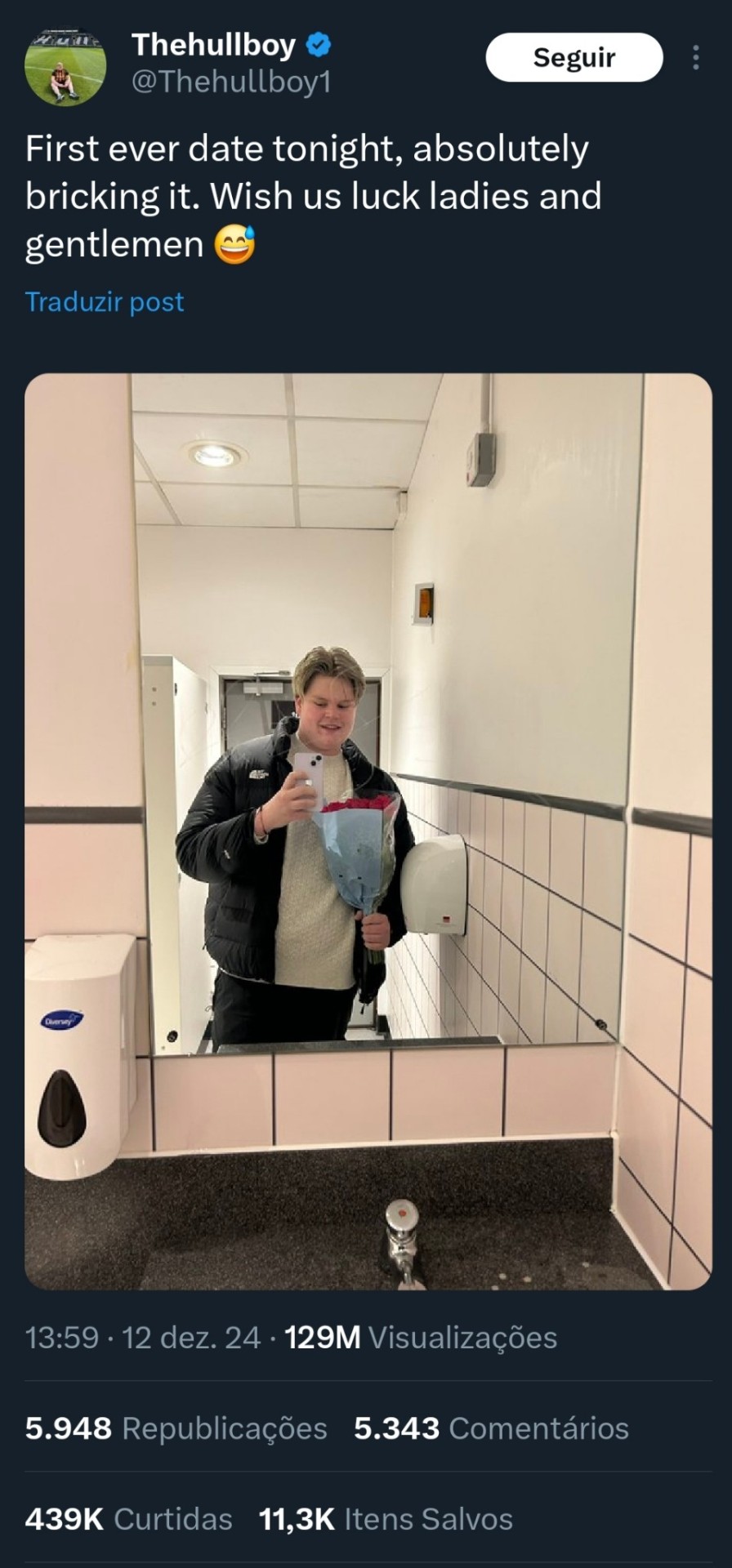


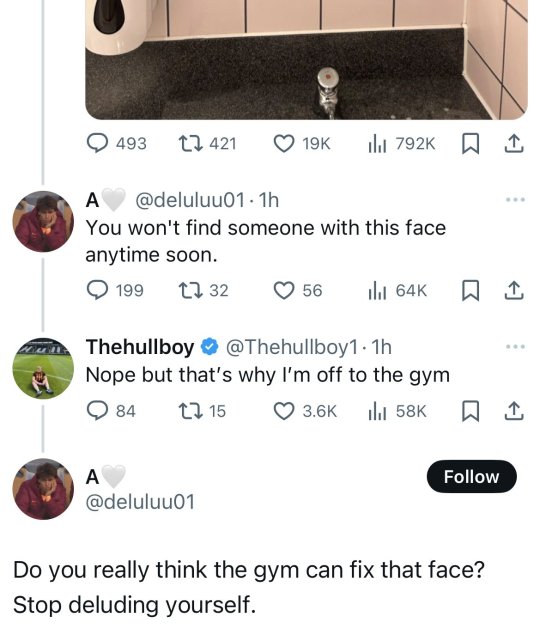
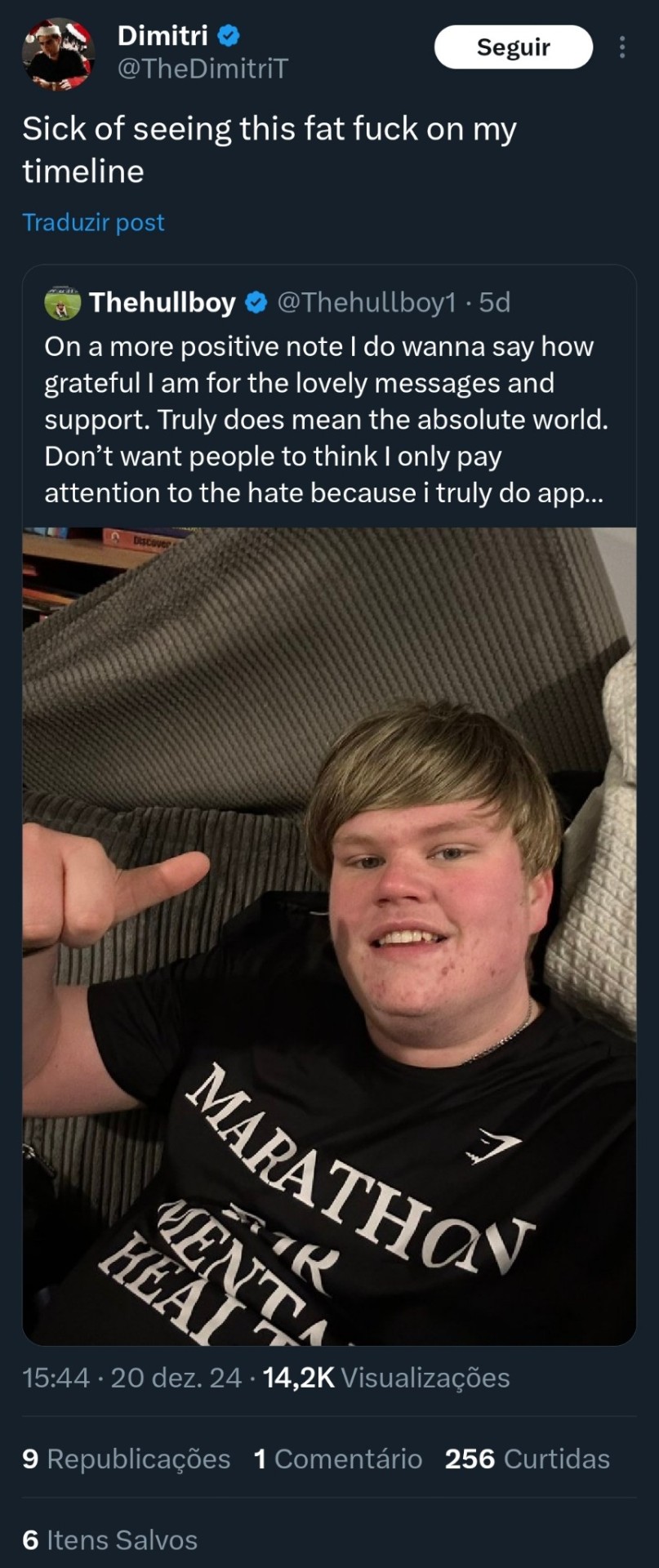
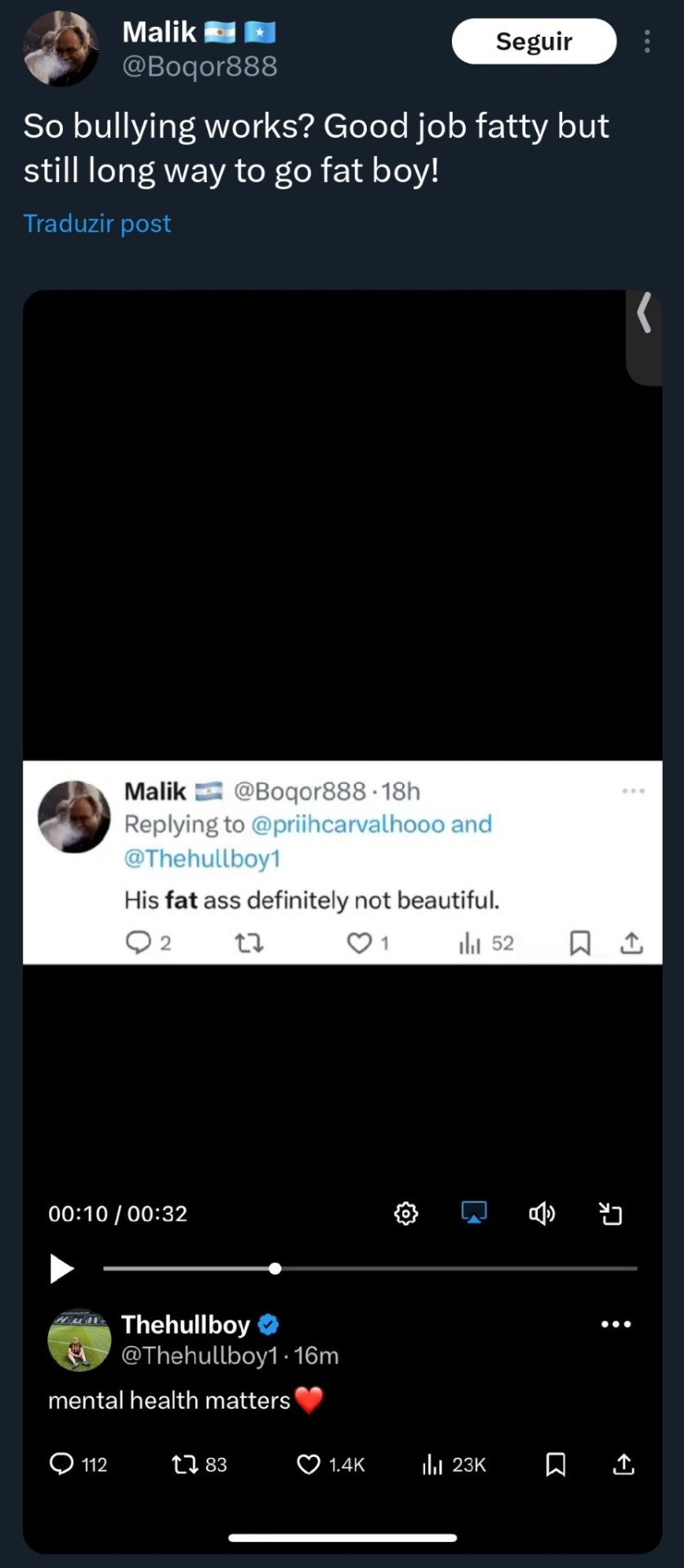

And as usual women were the ones who had to fix shit men started and got together clear up his mentions and tell him "hey you actually deserve to be treated like a human and not have to do something to earn basic kindness from others"
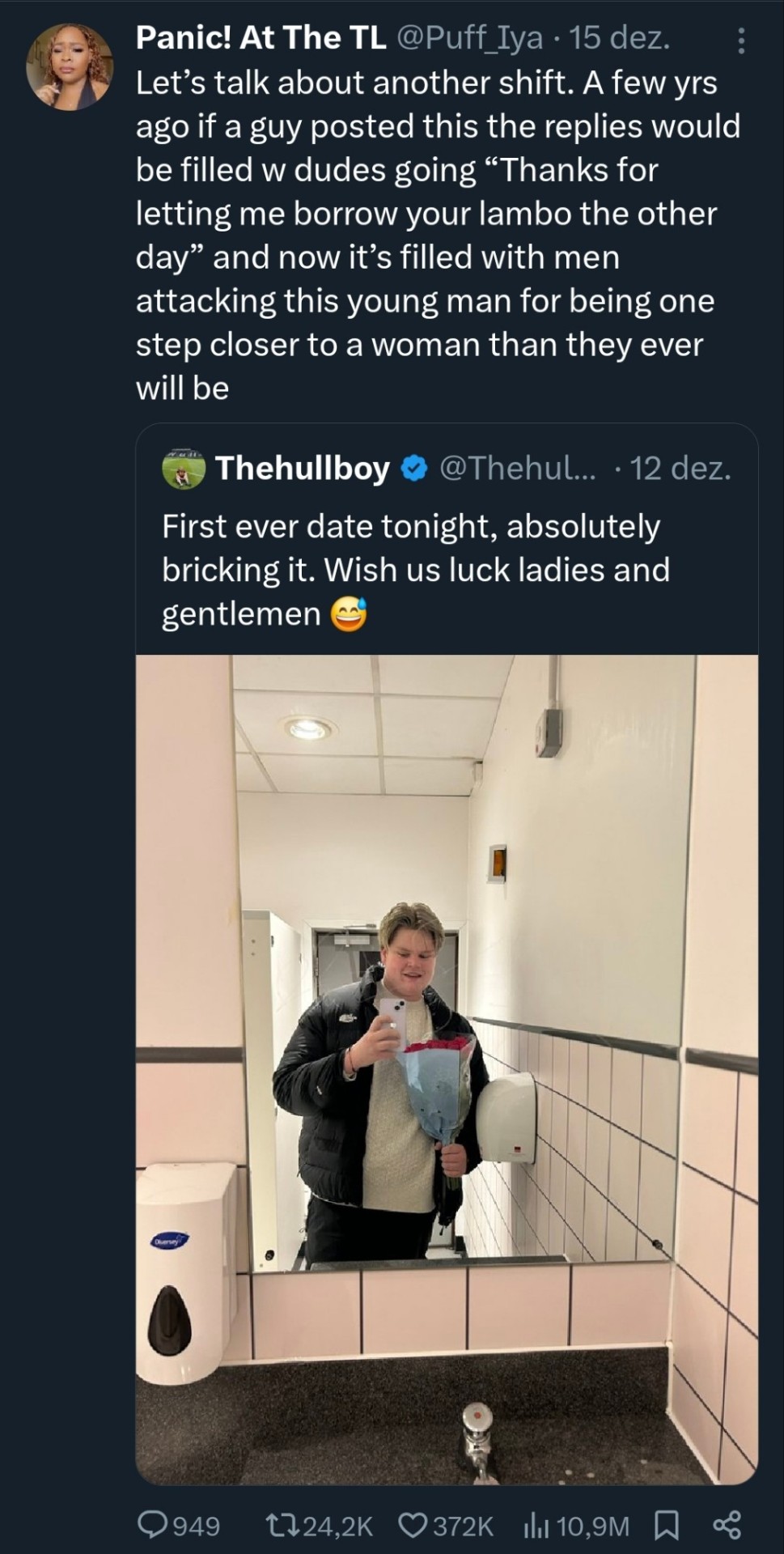
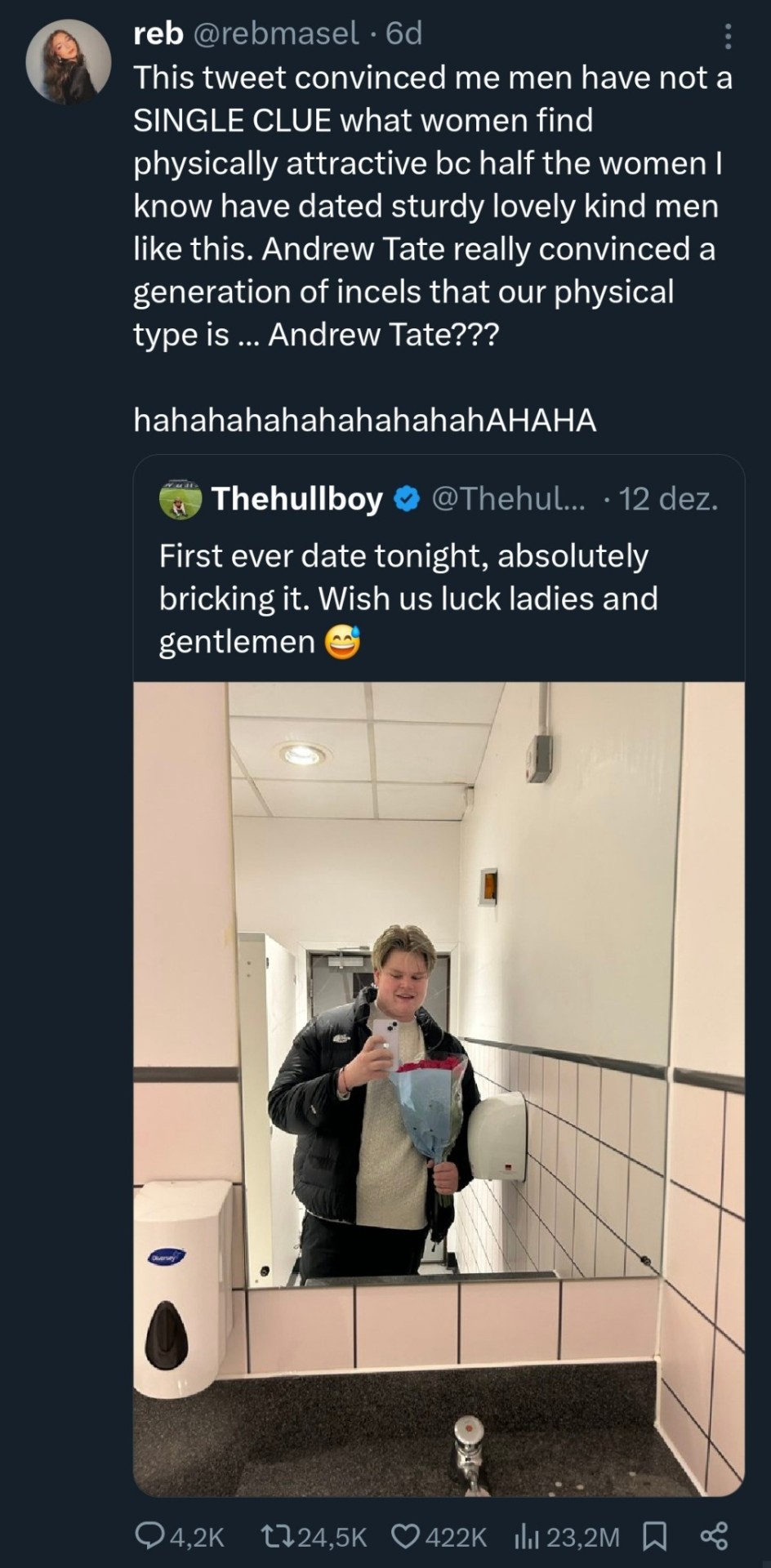
"male loneliness epidemic" is caused, worsen and exploitated BY OTHER MEN and it's not the obligation of women fix or alleviate this shit when they have absolutely nothing to do with it (specially when most of the world makes feminism and women's rights as close to illegal as they can and in the USA is a movement so undermined it can't even have success in defending a topic with 70+% popular support like Roe V Wade)
If you can't trust the men around you, if you don't feel comfortable with men around you, if you feel insecure with the men around you, step up to them or change friends, stop using women who 9 times out 10 have zero socialization or social insight to what you are going through to solve your feelings of inadequacy caused by the same gender as you at the end of the day.
#like i thought i had a lot of anger but i wouldn’t neg someone like this??#it wouldn’t even cross my mind#sorry if any of this sounds hostile or condescending i don’t think it does and i certainly don’t mean it to#i just know i’m awkward and sometimes come off as kinda pretentious in writing sometimes#so like. my apologies if that’s at all the case here#just a disclaimer: i am MOSTLY using woman to mean AFAB and man to mean AMAB#although i’ve never identified as trans#so i don’t presume to know how much expectations of masculinity/feminity affect transmen/transwomen respectively#and i recognize that those expectations are similar to male/female socialization#so trans people may have experiences that align more with either their AGAB or their gender identity in certain matters#i’m just not at all qualified to talk on that lol#i hope that makes sense 😬 i can’t reread it on mobile
75 notes
·
View notes
Note
I really like your blog! I had a question I've been wondering and wanted to hear more thoughts from others in the fandom who are critical of JKR. Do all people with gender dysphoria count as trans or nonbinary? What steps should they take to get help if they're distressed about their gender? I have a friend who is really dysphoric IRL and I'm not sure how to help them.
First things first. I'm going to define some terms.
BIOLOGICAL SEX
What you have in your pants. I'm not a biologist, so I can't get into too much detail - but I do know that while we generally use "male" and "female" as big catch-all categories, it gets a lot more complex and interesting when you get down into it. Male seahorses get pregnant. Clownfish can change their biological sex. Human intersex people are both pretty common, and only the tip of the iceberg.
I've always liked the "Staticians Creed" - "All models are wrong, but some are useful." Basically - we're trying to understand the world, we like patterns and we like to sort things, and a lot of the times those are useful for getting your head around something. 'Male' and 'Female' are useful categories... but I know that sometimes biologists will use "Breeding Type A" and "Breeding Type B" in situations where "Male" and "Female" don't track all that neatly.
GENDER PRESENTATION
But all of that is... honestly not super relevant on a day-to-day basis, because you can't know for sure what someone has in their pants just by looking at them. What you're actually looking at is someone's gender presentation. How they decide to dress, wear their hair, move, speak. I once saw a comedian (George Carlin?) do a bit on how there are some words - like "wonderful" and "aqua" - you only hear women use (and if a guy says them, you think he's effeminate/gay.) Obviously stuff like that depends a lot on location, dialect, etc. But there are gendered ways of speaking, he's completely right about that.
You hear the phrase "gender is a social construct" a lot, and it doesn't mean that gender isn't real, it means it's a thing that humanity decided on. Like money. Or the seven-day week. All that comes from history and anthropology, not science. Mostly we've decided on the two genders, but there are plenty of cultures that have three. And gender signifiers... look. Any 'girly' thing you can think of - wearing pink, high heels, long hair, skirts... I can name you a culture/time period that considered all those things extremely masculine. Fashion affects everything - beauty standards, ideal weight, and gender presentation too.
GENDER DYSPHORIA
So maybe in a sci-fi world where everyone wore identical baggy silver jumpsuits and there were no gender signifiers, there would also be no gender dysphoria. I have no idea. But we do in fact live in a society, like the Joker says, and in the society we live in, your gender presentation matters a lot. It affects how people treat you, what they expect of you, sometimes even what laws apply to you and what jobs you can get. Gender gets very bound up in identity, and it sucks when you feel like your internal truth isn't being projected out and recognized by the people around you. Woman who lose their hair or their breasts often suffer from a kind of gender dysphoria, and so they get wigs and boob jobs. Men who grow breasts after being on steroids suffer through a similar thing.
There's all kinds of study and debate over how things like "personality traits" come into existence, but I would say that a person is a collection of qualities, and depending on the person those qualities fit more easily into the "male" bucket or the "female" bucket. Of course every "male" will have "female" qualities as well, that's not news. That's what the little dot in the ying/yang symbol is suppose to symbolize, and "integrated anima" has been a thing since Carl Jung. But in general.
So I would say that gender dysphoria can be felt for reasons other than being trans or nonbinary. I also think that you can be trans/nonbinary and not gender dysphoric. Kind of a "yeah, if I could press a button and change my gender and have no social consequences I would, but I like the one I've got as a second choice just fine."
Gender dysphoria is absolutely brutal when it does hit though. If you've got a friend who is struggling with it... first, I'd compliment any change in their appearance they make. If they grow their hair out, cut it, paint their nails, start shopping in the other section of the store. It's lonely and scary to start experimenting with a new identity. Depending on my relationship with them, I would probably offer to take them shopping, or do their makeup, nails, or hair if that's something I think they'd like. Invite them to 'boys night' or to 'girls' night.'
I'd also ask if there's a nickname or alternate name they'd like to be called. You could make it a fun thing - pick out a name for yourself too. A friend of mine used "Captain" as a name/pronoun for a while, before committing to he/him and Bryce. Another friend was NJ and they/them before picking Nicole and she/her. I know people who are "'they' like both" "'they' like I don't really care either way" "'he' like an evil supercomputer from the 60s'" "'she' like a ship." I'd also see if there's any kind of of gendered address they don't like. "Bro" can be pretty gender neutral... but it isn't everywhere. Some people are fine with she/her, but absolutely hate being called "Ma'am."
Personally, I think it's wonderful and beautiful when identity can be approached in such an interesting way. I also think that the question "I feel weird in my body - maybe my gender presentation is off" is a far better and more useful question to ask than "I feel weird in my body - maybe I'm too fat."
30 notes
·
View notes
Text
Thinking about fandom or maybe adult spaces online. or maybe late stage capitalism?
Before I was on tumblr I was a member of an 18+ forum- tight knit community, and eventually one of the members slipped and revealed he was a minor. The mods were direct that they did not know this and now that they did they would have to ban him otherwise they could be held liable for exposing minors to adult content. They also were clear that he'd be missed and once he turned 18, we'd all enjoy having him back. [said monster girl forum was gone by the time he turned 18]
I had joined an 18+ forum once as a minor for adult content. Downloaded some batch BL manga raws. They were labeled Bondage and nothing else. The content inside was...a lot more than that. Recognizing that I had lied about my age and chose to engage with adult content, I had no one to blame but myself. Yes, the download was very under labeled, but this was maybe 2006 tags were not used often, and maybe I should have looked up what Zettai Reido was before I saw tiger x little boy. But I didn't so, I read up on BDSM to ensure I would not make similar mistakes again. [The site the forums were attached to is surprisingly still around, but the forums are not]
In the last few months, I have learned about a minor who started an 18+ server for a fandom who had not even *verbed* the *media* the server was for. [My understanding is that server immediately died off after this revelation. Understandable]
Yesterday I saw a post on a dark confessions blog which isn't an explicitly 18+ space, but most of the posts clearly are. This one was not and I engaged with it and had a nice (sfw) back and forth with the sender about that topic on a side blog that is 18+. It was only after I noted the sender says they are 16 in their blog title. Do I have more than a smattering of frankly vanilla 18+ posts on that blog? No, but I still want to label that blog 18+ because I am an adult and sometimes want to say adult things on the web. [This is on tumblr, the go nuts show nuts to banning female presenting nipples site]
X cum Twitter still allowing porn is interesting since that seems to be a holdover from when it was a bigger name. I expect Apple to eventually do what it did to tumblr and say 'ban the porn if you want to be available in the apple store' which is actually a wild amount of control for any given company to be able to wield, but between apple's phones and credit card companies we really have let a few major companies control what ostensibly public digital spaces are allowed to share. When that happens, a part of me will feel twitter deserves it because being an unregulated social media site has lead to trending topics being spammed with porn on a site that is clearly trying to be consumer friendly safe for all ages milquetoast dominator of people's attention.
Social media should be 18+ by default and if it does allow 13-17 year olds, moderation is required. Right now, sites try to have it all, and it's bad for everyone but advertisers who still aren't happy. But what corporation is in these days where growth is no longer possible without increasing wages which would cut into profit so everyone will suffer. Some with just suffer on a stagnant pile of gold while everyone else suffers under the crushing weight of capitalism.
Bluesky was a good site for a year and change, but already it's flagging posts about white male privilege as hate speech. I can see it living a half life of twitter.
Tumblr isn't going to make it out of this decade and that's sad. Forums aren't dead but good luck getting people who are used to suckling at algorithms to become active members.
Discords... personally the few fandom specific discords I have joined, introduced myself, and then muted, or they went quiet. I do hear- often- about minors in 18+ discords and predators using those spaces and of course discord will sell you out for a corn chip and keeps trying to turn profit.
Nothing can turn a profit in this day and age because no one can afford even the basics.
This was supposed to be a post on fandom. Can a fandom thrive in the modern day? Older series still have active fandoms, while modern series end and the fandom scatters to the wind for the next hot thing. Adult content is going to be relegated back to hand made zines but no one will be able to afford them. Official art and promotional materials aren't tracked and archived, and now with a.i. misinformation for series can only grow. Remember how many sites used hino ryutaro saturn art as official art back in the early 00s?
If you like work that isn't a multi season adaptation or billion dollar property, its disheartening that after maybe half a year, your fandom will be dead.
'Oh but fandoms are never dead as long as you're in them' I promise you bull shit. Being 50% of a tag, or fuck, 90%? It's lonely and I miss dedicated fansites but knowing that in the age of Google 3.0 no one would be able to find it let alone visit regularly, that effort would feel wasted.
I know we have neocities but the old world has been killed and the new world feels like a shambling lab crafted mutant whose violent and painful death might usher in a brighter tomorrow, but I don't know who or what is going to survive until then.
idk let adults make adult content and have adult spaces and help each other in these shit times, and keep your fandoms alive
0 notes
Note
Citing a bunch of statistics isn't the same as articulating a point. You have to relate them to the topic without going off-topic. And even if the study about domestic abuse in the lesbian community was false, the male/female socialisation doesn't account for abusive women and abused men. It removes the agency of women by portraying them as victims rather than people with their own goals and needs and how they interact with the world around them.
Also saying everyone is nonbinary is like saying everyone is bisexual. It's simply not true and this goes back to the absurdism. It doesn't matter what you think about gender. Other people will still have their identities and deconstructing that won't take away that person's agency to define themself.
Regardless of how similar two people's childhoods are due to gendered expectations, this doesn't mean they'll turn out the same. Two different people can be socialized the same and still turn out different. This is best seen with siblings who grow up in the same household. Yes siblings get treated differently even if they're the same gender but then that just highlights how trivial gender is in this situation.
Male/female socialisation is a very flawed way of viewing the world. I remember talking with parents about their kids and some of them would express frustration because the way they raised their kids didn't match up with how the child grew up. Some of them grew up and got themselves into trouble and lacked stability despite their upbringing. Regardless of how the child was socialized, they grew up to make their own decisions based on a variety of factors. Male/female socialisation is pseudoscientific and a cheap comfort tool for people who are uncomfortable with understanding that the world isn't a neat and tidy place. There are no easy and simple solutions.
You seem to have missed my point. I don’t use socialization to remove agency, I use socialization to describe behavioral patterns. Such as why men are more likely to rape women than women are. I don’t say it is all because of socialization, I say it can be because of socialization, which is completely different. One is deterministic, the other questions whether it could be the case.
And being against socialization does the same thing, it removes the agency of specific trans people from recognizing that they can be misogynistic because of how they were raised prior to transitioning. To say “this isn’t the case” is to say “this isn’t happening,” but it is. To ignore women’s concerns about their safety is to be misogynistic in of itself, and to invalidate those concerns instead of trying to compromise is self interest.
My idea of “everyone is non-binary” is completely different from everyone being bisexual because one requires biological behaviors and gender is not the sexes. Gender is an idea, the idea of women being associated with the color pink has no basis in reality. That’s why in other cultures different colors are associated with reality. There is no gender binary because we can’t even figure out what the binary entails, everyone has a different idea of what it is. If nobody can agree on whether a cat is a cat or a dog is a dog…do cats and dogs even exist? If you keep calling a dog, a cat, and a cat, a dog, then your idea of what a cat or dog is jumbled. You can’t discern it. There is no “true dog” or “true cat.” However when it comes to bisexuality…you are attracted to women or you’re not. You’re attracted to men or you’re not. You’re attracted to both or you’re not. Gender isn’t as simplistic as sexuality. Sexuality doesn’t differ from culture to culture, only the response to sexuality differs from culture to culture. That’s the difference.
You’re projecting other people’s understandings of socialization onto me. But I am not those people. I use socialization very simply. Socialization = patriarchy. Whether you’re a target of the patriarchy or not. That simple.
0 notes
Text
The HotD Costumes (EDITED - 9/23/23)
I know this tends to be the more forgiveable and even celebrated aspect of the ASoIaF TV shows and any fantasy novel series-adapted show.
Some of the outfits for the women in HotD were meaningful for what the writers wanted to produce in terms of characterization and/or were just stunning in their own right for modern audiences. There is no doubt the designers, stylists, and costumers put effort into this show.
And there’s obviously the expectation to see dissonant choices in action, look, etc. from canon in any element of an adaptation.
Then there’s always issues with material and budget.
And we still want our characters to look good and distinctive enough that we’d recognize the clothes coming from the show/story itself.
However....
Most of the HotD still doesn’t make sense in the context of a European medieval-styled world (that is Westeros) for a show that wants to depict the dynamics and image of a feudal patriarchal society. A lot of the immersive value gets lost when you have garments that expose a lot of the arms and shoulders.
I don’t really feel like these women are placed in a system of gender-based, sexual containment. and this was a problem I had back with Game of Thrones but forced myself to accept since it was out of my control.
Example #1
Laena’s Neckline Goes too Low and Shows Too Much of the Shoulders
Seems more like something you’d see on a modern fashion runway.

Example #2
It’s the slit showing Alicent’s breasts.
While “good” and girlboss for us, in Westeros and in court it would forever get Alicent labeled as a whore or immodest woman unfit to be Queen. She herself would never ever wear this with all her internalized misogyny.
And while being called/perceived as a "loose woman" or something similar does not mean total social exclusion AND high-risk loss of the only real access to power, authority given for women in modern Western societies, it does mean exactly that for Westerosi feudal noble/royal women. Alicent does have something to lose by this...which is why Rhaenyra is having as much trouble as she is having while not ever even dressing "provocatively" (except in her second pregnancy dress, which again, to us modern Westerners is not really considered provocative. But to Westerosi people? It is pushing it).
Since we acknowledge that dress is a political statement with a particular political message not just to Rhaenyra, the dress Alicent wore here totally contradicts her motivations of episode 6 and the claimed goal of upholding conservative values.
Why are we trying to deny that Alicent's personality and the very cultural context that have a hand in sharing who she is? Why are we denying the culture and what these women are up against by making these anachronistic pieces? Doesn't this make as if there is no patriarchy when Alicent wears this dress AND doesn't encounter any consequences for it? Where is the narrative conflict, the immersion?
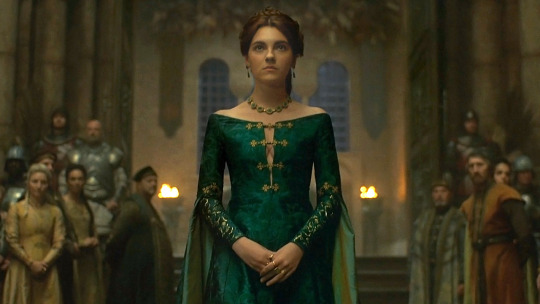
Example #3
Alicent’s bare arms -- GoT was strange for this sort of sleeve, too.

Example #4 (the point should be obvious by now)
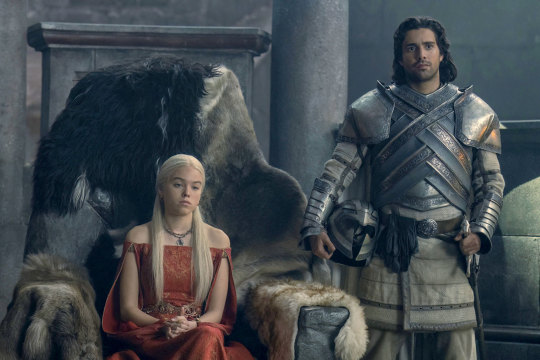
HotD is reminiscent (in terms of plain visuals and what it did to the constraints on medieval female agency) of the show Reign, which straight up had designs that would never exist in Renaissance (around 1400s-1500s) Europe.
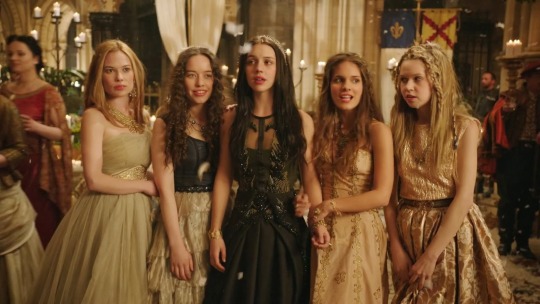
Except HotD is really trying to get us to believe and feel its world's women’s and girls’ sexual restrictions.....
These are the clothes that are closer to Westerosi noble dress (and even those dips into the breast are themselves bold choices):
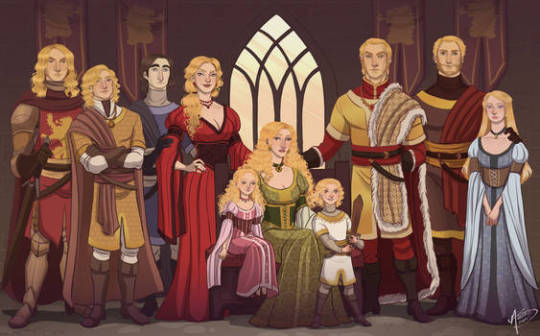
🎨: naomimakesart : "The Lions of Casterly Rock"
Ironically, the male costumes are much more faithful....since you know apparently there’s less of a stake there.
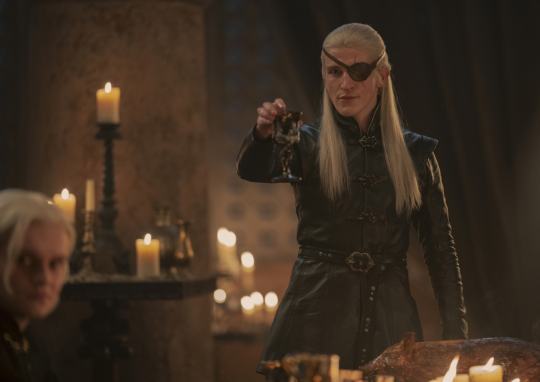
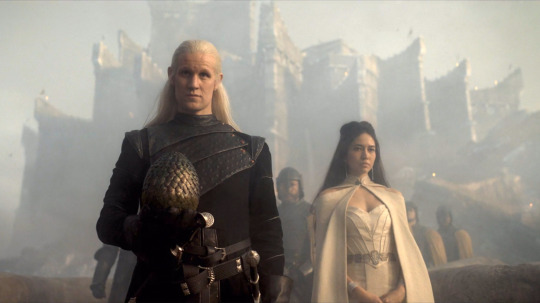


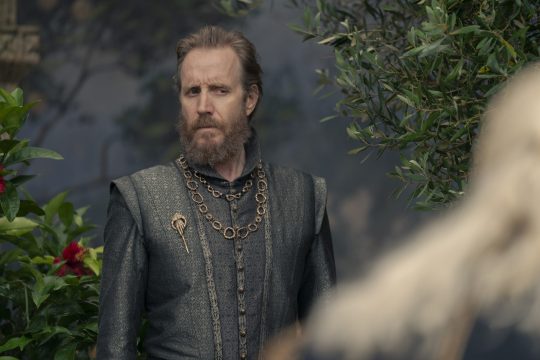
And even though it’s GoT, there is this incompatibility with clothing we can imagine for Westeros:

....Even with Olenna being a much older woman (undesirable for a man looking for a marriage) and the show making the Tyrells/people in the Reach a little less covered.....
The stark contrast of these garments of Margareyn and Olenna gave a contradiction instead of a subtle difference of maturity.
How does Margarey get away with that much? even with a rich and powerful noble family, she’s still a girl who had an image of female chastity to uphold and conform to. She wouldn't be exempt from that. If she had full sleeves and a little dip in the chest like in the illustration by naomimakesart above, that would have made so much more sense.
By the way, here are examples of some real-life medieval female clothing (of various specific decades and regions within the overall medieval era [c.400s - 1400s]):

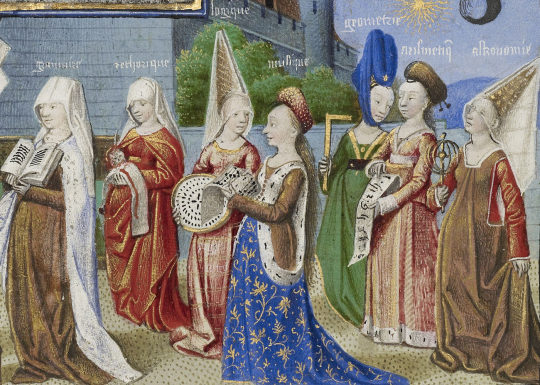
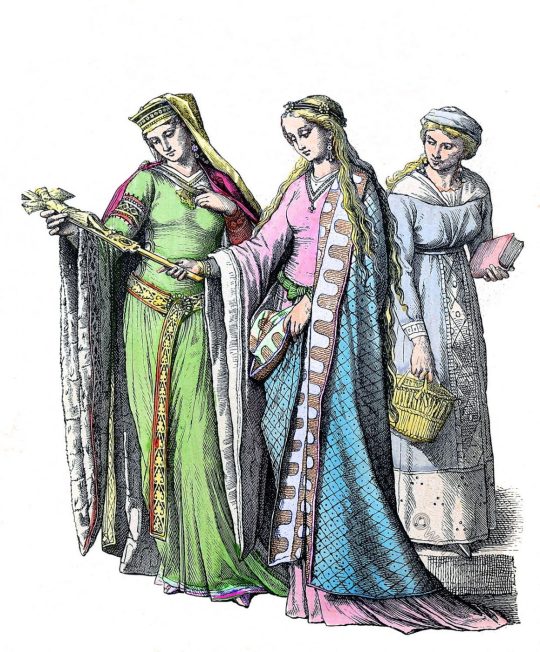


🎨:
Albert Kretschmer @ worldhistory.org
Philosophy Presenting the Seven Liberal Arts to Boethius (detail), miniature in a French manuscript of The Consolation of Philosophy attributed to the Coëtivy Master, about 1460–70 @ blogs.getty.edu
world4.edu
nehalenniacreation.wordpress.com
prue batten
#hotd costume#hotd critical#hotd#house of the dragon#hotd comment#got critical#got costume#got comment#asoiaf costume#asoiaf#a song of ice and fire
52 notes
·
View notes
Link

When you think of grunge, do you picture a bunch of long-haired White guys in plaid shirts, singing about teenage angst and self-loathing? Time to expand that viewpoint. Standing above them all should be Tina Bell, a tiny Black woman with an outsized stage presence, and her band, Bam Bam. It’s only recently that the 1980s phenom has begun to be recognized as a godmother of grunge.
This modern genre’s sound was, in many ways, molded by a Black woman. The reason she is mostly unknown has everything to do with racism and misogyny. Looking back at the beginnings of grunge, with the preconception that “everybody involved” was White and/or male, means ignoring the Black woman who was standing at the front of the line.
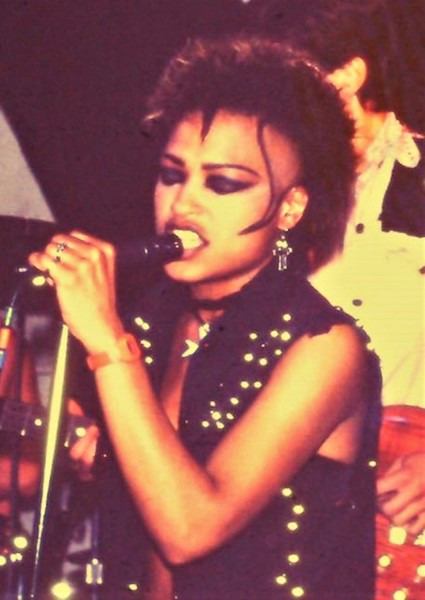
Bam Bam was formed as a punk band in 1983 in Seattle. Bell, a petite brown-skinned spitfire with more hairstyle changes than David Bowie, sang lead vocals and wrote most of the lyrics. Her then-husband Tommy Martin was on guitars (the band’s name is an acronym of their last names: Bell And Martin), Scotty “Buttocks” Ledgerwood played bass, and Matt Cameron was on drums. Cameron would leave the band in its first year and go on to fame as the drummer for Soundgarden and Pearl Jam. But he paid homage to his beginnings by wearing a Tina Bell T-shirt in a photoshoot for Pearl Jam’s 2017 Anthology: the Complete Scores book.
“For some reason a couple of skinheads are up front, calling her [the N-word] And all of the sudden, Bell grabs a microphone stand and she starts swirling it around her head like a lasso… She swung that fuckin’ thing around her head and about the fourth time, she smashed that son of a bitch.”
Bam Bam’s sound straddled the line between punk and something so new that it didn’t have a name yet. Their music combined a driving, thrumming bass line; downtuned, sludgy guitars; thrashy, pulsing drums; melodic vocals that range from sultry to haunting to screamy; and lyrics about the existential tension of trying to exist in a world not designed for you. The band’s 1984 music video for their single “Ground Zero” is low-budget, but Bell’s charisma seeps through.
“She was fucking badass. That’s all there is to it. She was amazing as a performer. I’ve only seen one White male lead singer command the stage in a similar way that Tina Bell did, and that was Bon Scott of AC/DC,” says Om Johari, who attended Bam Bam shows as a Black teenager in the ’80s and who would go on to lead all-female AC/DC cover band Hell’s Belles.
youtube
Christina King, a Seattle scenester who was close friends with Bell from 1984 until the early ’90s, says the singer’s talent was obvious. But she believes a lot of people dismissed Bell as a gimmick.
Among those attending their shows: Future members of grunge bands like Nirvana (Kurt Cobain did a stint as a Bam Bam roadie), Soundgarden, Alice in Chains, and Pearl Jam.
“I remember one person saying to me that they didn’t get ‘the whole Black girl singer thing,’ it just didn’t fit whatever they were into,” says King. “They were too ahead of their time.”
Bam Bam came into being in an era when hundreds of underground clubs, taverns, bars, and social halls — anywhere that you could cram in a band — were within the Seattle city limits. Bam Bam played almost all of them, and often to big crowds: The Colourbox, Crocodile Lounge, Gorilla Gardens, Squid Row — just to name a few.
Among those attending their shows: Future members of history-making grunge bands like Nirvana (Kurt Cobain did a stint as a Bam Bam roadie), Soundgarden, Alice in Chains, and Pearl Jam. Not to mention all the other people, mostly White and male, who would become prime targets for music labels trying to market this new sound.
Bell “already possessed everything they were trying to attain. She had a truer rock and roll spirit than almost any of those guys in that town. Everything they tried to do, she naturally was,” says Ledgerwood, still a loyal bandmate.
One Seattle club, The Metropolis, became “like our fucking living room,” says Ledgerwood. It was also the site of an overtly racist verbal assault against Tina Bell.
“For some reason a couple of skinheads are up front, calling her [the N-word],” Ledgerwood recalls. “And all of the sudden, Bell grabs a microphone stand and she starts swirling it around her head like a lasso… She swung that fuckin’ thing around her head and about the fourth time, she smashed that son of a bitch… She nailed that fucker right in the temple of his head. Split like a melon. And the other guy next to him caught it too, they go down, and we’re like, ‘What the fuck?’”
Ledgerwood says that after going backstage for a while to regroup, Bell came back “and put out the most blistering set of our fucking career.”
This could easily be an anecdote about Bell’s power, her resilience, and willingness to fight back against oppressive forces. But it’s also a story about the cost of being a Black woman who does something that some people don’t expect or approve of.
“She’s being pulled out of her zone because somebody is acknowledging how the rest of the world can see her,” says Johari, empathizing with the star rocker. “And even to react to it by picking up a microphone and smashing someone in the face, that means that that incident cost her not only that moment it takes to get back into the song, but the whole [effects of her] action will last for weeks.
“She’ll replay that over and over and over and over again. And then the people she sees that were there when it happened, they’re gonna come up to her and they’re gonna forget everything that she’s saying, all the stuff that she had did, and they’re only going to focus on, ‘I was at that show where you knocked a dude in the head for calling you an N-word,’” Johari says. “It has nothing to do with her artistry. But it reminds her of the way in which she has to be prepared, just in case it happens again.”
King remembers Bell also felt that some of the other men in the band’s changing lineup failed to treat her as an equal partner: “She’s getting that from her own band members — what do you think audience people are like?”
A European tour in the late ’80s gained Bam Bam international fans, but ended after Bell and Martin split up, and Bell was caught in an immigration enforcement dragnet in the Netherlands.
When they returned to the Pacific Northwest, Bam Bam continued playing shows until 1990, when Bell abruptly quit as they were packing up to head to the studio in Portland, Ore.
“She had just had enough,” Ledgerwood says. “For almost eight years she had almost literally eviscerated herself for the audience.”
But that work never resulted in the national recognition they deserved.
“Grunge, whatever that means, is being identified as from your community, your colleagues, your sound that you were a participant in help shaping, and you’re not even mentioned in any of it.”
“Sometimes you need to be a little bit of an asshole to protect yourself. And Bell wasn’t much of an asshole,” Ledgerwood adds. “She was a pure-hearted person and had a really hard time believing that people couldn’t accept her over something as stupid as race.”
Bell didn’t just quit the band, she withdrew from music completely, says her son, Oscar-winning documentary filmmaker TJ Martin. Not out of resentment, he adds, but perhaps to escape the painful reminders that the music she helped pioneer was now earning other bands multimillion-dollar record contracts.
“Grunge, whatever that means, is being identified as from your community, your colleagues, your sound that you were a participant in help shaping, and you’re not even mentioned in any of it,” Martin says. “I can’t even fathom what that would feel like for it to be sort of spit back in your face with such frequency.”
Ledgerwood believes Bell died of a broken heart. But when Bell died alone in her Las Vegas apartment in 2012, the official cause of death listed was cirrhosis of the liver. She had struggled with alcohol and depression. Her son says the coroner estimated her time of death as a couple weeks before her body was discovered. She was 55 years old.
The things that could have told Tina Bell’s story in her own voice are lost. Martin arrived in Las Vegas to find that the contents of his mother’s apartment — except for a DVD player, a poster, and a chair — had been thrown away. All of her writings — lyrics, poems, diaries — along with Bam Bam music, videos, and other memorabilia — went in the trash without her family even being notified.
If you think you were in Seattle in the ’80s, in the grunge scene, and you don’t remember Tina Bell and Bam Bam, you probably weren’t really fucking there.
“I couldn’t help draw a parallel between her not being respected and seen in the first chapter of her life, as the front person of a punk band, and then even in death being disrespected and not being seen for the merits of the life she lived,” says Martin.
Bell’s death is also an indictment of the way she was written out of her own story. The way grunge’s almighty gatekeepers chose to look through her instead of at her. Grunge became the domain of alienated young White men in flannel shirts, and Tina Bell didn’t fit the narrative they were trying to sell.
“Black herstory can suffer immense amounts of erasure if somebody is not brave enough to ensure that women get counted,” Johari says.
To many of those who were part of the scene at the time, the amnesia seems intentional. Ledgerwood brings up the seminal history of Seattle’s grunge era, Everybody Loves Our Town. In it, the author refers to Bam Bam as a three-piece instrumental band mainly notable because Matt Cameron was the drummer. Tina Bell isn’t even mentioned.
“How in the hell would he have a recollection of how great Bam Bam and its drummer was, and not this unbelievably beautiful woman, this firecracker, this explosive rock and roll goddess?” Ledgerwood asks. “Even if he thought she sucked, to not remember the only Black woman on the whole fuckin’ scene is — well, it’s like that old joke about the ’60s: If you think you were in Seattle in the ’80s, in the grunge scene, and you don’t remember Tina Bell and Bam Bam, you probably weren’t really fucking there.”
You can listen to more of Bam Bam’s music on this Spotify playlist. A vinyl album with the band’s songs is coming out this year on Bric-a-Brac Records.
#Alice in Chains#Bam Bam#black history#black women#black women in rock#grunge#Kurt Cobain#music#Nirvana#Pearl Jam#rock#Seattle#Soundgarden#Tina Bell#women in rock#women's history#80s
302 notes
·
View notes
Text
An Oiran's Sacrifice - Kokushibou x Oiran!Reader
Oiran
Oiran (花魁) was a specific category of high ranking courtesan in Japanese history. Divided into a number of ranks within this category, oiran were considered – both in social terms and in the entertainment they provided – to be above common prostitutes, known as yūjo (遊女, lit. 'woman of pleasure')
Warnings: Strong language, prostitution
Word count: 3758
Next chapter
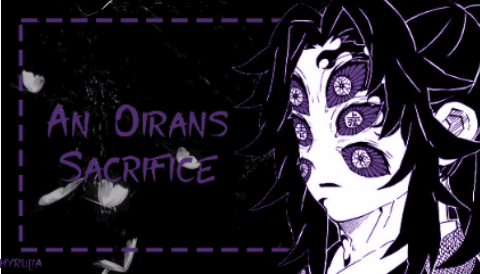
`` Why must you do this to yourself? ``
`` For my family. ``
`` Family means nothing if you are working as a self degrading prostitute. ``
`` It is what I must do if I wish to live. ``
◇◆◇◆◇◆◇◆◇◆◇
It was yet another late evening, alone in your compact minka, yet it never was a bother, for this was how you usually spent your nights. Due to your poor living style, your father was driven to thievery. It was the only way to keep the two of you somewhat fed, clothes on your back, and a roof over your heads. Your living style has helped you become more grateful of any small blessing that came along your way. Even the smallest fortune would put a smile on your face because it ended the little sorrow in your heart at the realization of your poverty.
``[Y/N],`` You heard a voice beckon to you. The voice you knew all too well at this time of night that originated from the only person who would even dare leave do commit such crimes. `` Coming father. ``
Getting up slowly from your dimly candle lit chabudai, you scurried your way to the wooden door of your minka, letting inside the only other family member you had, your father. Watching how he takes slow strides inside the bleak, wooden-paneled small space of your home, you mentally cursed yourself for ever allowing yourself to come to terms with your reality. Deep down you hated how the man in front of you risked his life nearly every night just to make sure the two of you were fed, yet, it is not like you could do much to change your misfortune, for it is your depressing reality.
`` Miracles do happen [Y/N]. I promise you, with this, we can finally turn our life around, and leave this dreadful place. `` Being intrigued by your father's words, you eyed the gleaming object in his hands that you unfortunately recognized. `` Father, why? From the Suzuki family no less? They will have our heads if we are to be caught..! ``
Your worry was bothersome to your father. He knew just as much as you what the consequences are if he was ever to be caught. It wasn't easy for the male to successfully loot the expensive statue in hand, so you didn't doubt he'd do his best to hide any evidence of his caper. You couldn't help but worry of your future, because the Suzuki family was the most wealthiest family in your little mountain-side village. Known for being ruthless to anyone that disrupts their peace and fortune, the Suzukis will not tolerate such thievery inflicted upon them, which is why your worry only increased even more because you did love your father of course, and to see his head served on a silver platter was gut wrenching.
`` [Y/N], rest assured that we will not be caught. We will use this to escape this little village and live somewhere safer, maybe in the forest like your mother always wanted. We can live a peaceful life without relying on thievery. Please, my beautiful blessing of a daughter, place your trust into me. `` You merely sighed at your father's declaration. You knew he'd pull the mother card on you just to persuade your emotions even more to agree with his actions. Obviously you do not, because at the end of the day stealing is bad and punishable by death, so the constant worry always lingered in your heart.
`` I do not care if we are the lesser fortunate of our village, I just want to you to stop stealing. I already have a job- ``
`` That barely pays you enough. This is why I do what I must to keep us alive. I am ending this conversation here, I do not want to hear another word from you [Y/N]. Now, please get your much needed rest, you are developing eye bags. `` With those somewhat encouraging words to actually get some rest, you trudge your way to your comfortable futon, which wasn't too much of a distance because everything was set in the same confinded room of your one room house.
Your father blew out the warm colored candle before getting comfortable in the similar futon next to you, letting out a small groan as his muscles seemed to relax. Letting a small sigh escape your lips, you turned over so that you were laying on your side. Whilst closing your eyes, you finally allowed yourself to escape into a somewhat peaceful slumber, since you strongly believed you were in the clear from being beheaded in public since your father managed to get away unscathed.
Just as quickly as you fell asleep, you found yourself waking up to the bright light of the sunrise that glistened through the only window of your home. Yawning, you covered your mouth while slipping out of the warm fabrics of your futon, peeling open your eyes slowly. From how quickly you woke up, you felt as though it was going to be a rather long day. Truth be told you wish you had the urge to sleep longer, for you did not wish to face the day with a guilty conscience lingering over your head as a constant reminder of what your father does in the wake of the night.
`` Father, we have lots to do today, please wake up. `` Expecting to hear a soft groan in return, you turn your head to the now empty futon before you. Shock was all that was found on your face, because your usual routine was to wake up your father and start the day by finding any food to buy from the market place, but that is not the case today. Your father was gone.
`` Father? FATHER?! ``
Worry took over your emotions just as fast as your shock did. The man who was usually still in bed was no longer there so obviously you'd do your best to look all over for him. Getting out of your futon just as speedily as you woke up, you slipped on your geta shoes and bolted out of your living space and onto the busy street of your village. It was all too sickening when you tried to make sense of the situation, but only one solution came to mind. That solution only seemed to make more sense as you ran through the people-covered streets, pulling up your kimono just a bit so it'd be easier to run around until a loud boisterous voice was heard from the townsquare that confirmed every suspicion you had.
`` This pitiful man chose to steal from me! How sad that his life must end like this. It is only fair that death is his punishment for taking a precious family artifact right? `` The cheers of those in the audience caused a ringing in your ears. That was your father they were wishing death upon, and yet nobody seemed to care. As long as their own heads were on their shoulders, they were fine.
Pushing past the multiple men and women in front of you, you managed to escape from the crowd, yet to your disapproval, you were now directly in front of the cause of all the commotion, Suzuki Kenta. Your act of boldness triggered all eyes to be on you, but you could care less. You did not want to lose yet another family member in the arms of selfish people. So, bowing down quickly, you mustered up the confidence to beckon out to the head of the Suzuki family. `` Suzuki-san, as this pitiful mans daughter, I beseech of you to please, spare his life. He knew it was wrong yet it was only to save us both from the misfortune inflicted upon us!! Please, I beg of you..! ``
In your desperate plea, your eyes became bloodshot since tears were welling up on your bottom eyelid. Now looking up from your bowing stance, Suzuki Kenta had prominent veins on his face that showed his distasteful attitude towards your cry of desperation. It was obvious the angered male did not want an interruption, especially from a poor female no less, so obvious agitation was expected.
`` This woman.. really believes she can save this scum of a man... how cute. `` Kenta took slow strides to your smaller, still beneath him, form. You could practically feel him looming over you in utter disgust for ever believing you could persuade such a powerful man himself. Deep down you had a feeling that both your heads would be severed off, or hanged and humiliated publicly for your foolish actions. Who would believe this is how you unfortunately came to your end. Desperately trying to save your thieving father, knowing what he did was wrong? Bitter. The Bitter truth always hurts.
`` Look at me. ``
And as just as quick as he said his order, you gave in and risen your head from the ground, your cheeks being stained by hot tears rolling down your face, looking even more pathetic than what you had wished. Although if it was going to save your father's life, then so be it. If you were going to look like the dirt that everybody walked on, then that is what you will do. Sacrifices like these were common you, especially saving your own fathers life multiple times before this so this was nothing new.
`` You are just as pitiful as your father. You wish to save this low life man who had the audacity to steal from me? `` Kenta snarled in distaste. You had no choice but to stay silent, for there was a blade in the male's hand that he could use any second to take your life, and if you wanted to live, you needed to be careful and word your sentences just as carefully. `` I apologize on his behalf, I wish to make it up to you Sakimi-san. ``
`` Clever girl.. I have taken rather a liking to you. You are smart and you know your place, I will respect that. `` Letting out a relieved sigh, you eye the weapon in his hand before averting your gaze back to his twisted and still somewhat agrivated face. Kenta looked as if he was contemplating something in his head, all the while his bodyguards made your bloodied father watch everything unfold before him without a say in anything.
`` You do have quite the beautiful face, and a body that compliments you oh so well. I will give you two options Miss Fujisaki, you either return the stolen item and watch your father die here and now, or, you become an oiran for my lovely son. Pick wisely, and immediately. I expect an answer now. ``
Murmers were heard from the crowd who also stayed to watch the commotion unravel before them. Of course everyone knew all too well what the life of a low ranking oiran is, and knowing that the options given were supposed to be a punishment, you were going to be no more than a yujo, working as a sex slave for Sakimi's sex hungry son. But, if it meant saving your father's life, then so be it. `` I will accept the life as an oiran.. Sakimi-san.. ``
`` Perfect! I didn't want to get this perfectly good suit dirty so gentlemen, let the scum go. `` Just as quickly as Kenta snapped his fingers, the bodyguards let your father go. Seeing his bloodied and beaten to a pulp body ignited a fire in your heart as he tried his best to make his way over to you. `` Father please save your energy, we'll get you some help.. `` you addressed as he pulled you into a tight embrace.
`` Oh do not worry! My men will get him the help he needs in due time, for now please allow yourself to be escorted to my estate for further details of your new living space. ``
`` I thought I was an oiran, do I not have the decision of going back home. ``
`` My lotus, please do not talk ba- ``
`` You will be nothing more than a yujo. Your face is sweet but your tongue is bitter, and so as a punishment you will be completely submissive for my son. ``
Your eyes practically doubled in size. The fact that Kenta believes you are so willing to not at least have a shred of your dignity left is beyond anything you ever thought of. After being publicly humiliated, you'd at least expect for him to understand how you felt, but at the end of the day, selfish rich people know no boundaries. Sighing once more with your father in your arms, you slowly stand on both your dusty legs, all the while helping your father keep his balance. ''Fine then..'' was all you said.
You found yourself now following the Sakimi bodyguards, for they were escorting you to the one and only Sakimi estate. It was rather large and sat on an even larger hill, so the trail up the grand staircase was a bit of a hike for the beaten man that you loved so dearly. During the entire walk it truly allowed you to comprehend your reality for the rest of your life. You were going to be a oiran, the lowest ranking form of oiran no less. It had your blood boiling with how easily you are so willing to save your father from death time and time again.
Since the small little hike would end soon, you took the chance to take in your surroundings. It wasn't like your previous way of living in the village, but a more extravagant way of living. There were statues with small-scale ponds in front of them that had different colored koi fish inside. The afternoon brightness of the sun reflected upon the water, but that was not the only thing because you could catch a glimpse of your dirtier form from your bow of respect from earlier. Looking back you realize the man who you will be working for deserved now ounce of respect, for your body was yours, even if you were to be a yujo you'd still keep your dignity.
Other than that, in your barely noticeable reflection, even under all the small specs of dirt and filth, your face resembled your mother. You pretty much looked like a copy and paste version of the woman so it was no surprise that you had her beautiful features. Above all that it still saddened you that from above, she'd be watching her daughter become a self degrading prostitute if it meant saving her dear father from execution. A reality, that was so tart to even look at in the eyes of others.
`` Ahem.. Fujisaki, ``you heard a feminine voice call out to you. It was shocking so your head whipped to the side to whoever called out to you. To your misfortune, it was the head oiran of the Sakimi estate. Lowering your head out of respect, you partially gripped your father's shirt out of nervousness because it would be the start of a new chapter in your life that you never wanted to reach. `` Now that I have your attention, let me look at you. ``
Before you knew it your father was ripped from your arms by the same bodyguards who held him at knife point. Your face of worry was noticed by those around you, so to direct your attention the head oiran, who you had yet to introduce herself to you, held your face in her amazingly soft hands. `` Ignore them, they're going to patch him up and send him home. You, my beautiful underling, will be coming with me and my ladies. ``
Her boldness wasn't shocking, so following her didn't make you as uncomfortable as you perceived it would be. The beautiful woman who held your wrist as you finally entered the large minka, had started speaking so quickly that your mind took a bit to process. `` I am the head oiran known as the tayu and you are my precious little yujo. I'm Sakura, over there is Jade, that's Blossom, and there is Waterlily. You will address us by our oiran names only and the same goes for you. You will no longer be "Fujisaki," but rather a lovely name, Lotus. ``
The irony in that moment made you want to cringe. You only permitted your father to call you such a thing, but now that it is what others shall be addressing you, it caused an obvious look of discomfort to be plastered on your face. Just as suddenly as Sakura stopped talking, she just as suddenly dragged you to another, more secluded, area of the minka. Inside the room she pulled you in looked like an oversized closet, easily bigger than your one room home.
`` In here is where you shall prepare yourself to look proper, right now you look like actual filth, so please, make yourself look presentable for Master. ``
Before you could utter out a single word, Sakura left you, alone in a pretty large room without any guidance. During the time your mother was with you, the both of you would pass men with many different beautiful women surrounding him. Despite being too young to fully understand their jobs, your mother simply said, `` They are called oirans my dear, beautiful women for service. ``
With that in mind, you remembered how the others look and tried your best to copy their image. Grabbing a nearby hakuhodo, you dipped the end into the white power and began gently stroking your face, turning your fair skin milky white. It was a longer process than anticipated so once you were done you had to message your muscles because making sure the powerdy substance stayed on your face took the longest. You felt embarrassed to call for help, so you being you decided to do everything yourself. Grabbing what you perceived to be an eyeliner pencil, you tried to keep your hand steady as you basically used yourself as a canvas of art.
Unfortunately it was another long process because a few strokes were a bit wobbly, but finally perfecting the look made you feel a sense of pride that you could do such things yourself. Grabbing one more brush, you dabbed the end into a red power and brushed lightly where the end of your eye starts and stopped just about before your hair line. Moving onto the multiple shades of lipsticks, you grabbed a bright red and began applying the shade onto your lips. `` I look ridiculous, don't I mother? ``
Your tilted your head up to imagine her soft laughter at how content you are with your actions. You still felt pride in the fact that you were able to successfully look like a professional oiran without help from the tayu. Smiling gently to yourself, you got up from the plush chair to look for your new kimono that'd you'd be working in starting from that point on. When you came to no prevail, you sighed once more while scampering your way to the wooden sliding door. `` Sakura-san? ``
`` Yes my underling? `` Was all the beautiful woman said from a little ways away. Telling by the gentleness of her voice, she wasn't too busy at the moment so you scurried over to her as quickly as you could.
`` If you are not busy at the moment Sakura-san.. may you help me with my kimono?``
`` Of course not my little lotus, come with me. ``
Following behind her yet again, she leads the both of you into the dressing rooms where you originated from. Her movements were fluid and as gracefully as she could, pulled out each layer of kimono you'd be wearing for the one they called "master." Placing each layer onto a nearby chair, she faces you with a softer expression while holding your face in her hands once more, like earlier. `` For a fresh underling, your make-up is more professional than most. I must admit that I am proud of you my Lotus, so please hurry and get dressed so I can give you a proper tour of the Sakimi estate. ``
And with that, Sakura left, leaving you to your disposal of getting dressed. Unfortunately she hadn't told you the order of each layer, so it was more like a ball game to see if you actually got it correct. From your eyes, it seemed like everything was a test to see just how much you knew about an oirans job. In contrast, you were a clever one, so it wasn't too tough to memorize the oirans you passed as a child, remembering each layer and how they dress accordingly.
Yet again, another long process which you figured out all on your own.
Looking in the mirror, you no longer recognized your mothers features on your own face. In your eyes, you saw another person entirely, that was no longer you. To everyone else you'd be known as Lotus, not [Y/N] Fujisaki. It was the future you brought upon yourself, so keeping your chin raised high, you took slow strides out of the dressing room and looked for Sakura who was supposed to give you a proper tour, but to no avail, you did not see the woman from earlier.
And so, you took it upon yourself to look around until you found yourself on the engawa that wrapped around the entire minka. The evening breeze hitting your face as you looked down at the small forest beside, taking in the sunset cascading down upon you. You hadn't expected for the entire day to simply rush by. It felt like just yesterday you were waiting for your father to return from his capers almost every night, but no longer shall he steal, owing to the fact that you'd make money as a yujo.
This was your life, and you had no say in how it was to go for the rest of your days.
◇◆◇◆◇✧◇◆◇◆◇
`` Ohhh..~ She is a pretty one Kokushibou-dono~ I want her as my next meal. ``
Kokushibou, who wasn't listening to the Upper Moon Two, eyed a woman who had changed entirely since the last time he had seen her. His confusion didn't go unnoticed due to the Upper Moon One usually having a stoic expression. `` You seem to have taken a liking to her? How pitiful she is nothing but a prostitute n- ``
Before the demon could finish his sentence, one swift movement of Kokushibou's blade had his head off in seconds.
`` Silence, Douma. ``
◇◆◇◆◇◆◇◆◇◆◇◆◇◆◇◆◇◆◇◆◇
#kokushibou#kokushibo x reader#kokushibou fanfic#kokushibou smut#kny fanfic#kny kokushibou#kny x reader#kny imagines#kokushibou imagines
209 notes
·
View notes
Text
[“To be a lesbian, do I have to sleep only with women?
Circumstances being what they are, too sordid for me to elaborate upon without getting shrill, your confusion is understandable. Even if we were in the business of policing female behavior and isn't that job best left to those with more experience and appropriate involvement; i.e., men?— one cannot always expect to find undiluted lesbian activity among even pure lesbians.
Don't panic; the occasional slip into the shallow end of the male pool, though not a sign of great discernment or even sanity, does not automatically invalidate your lesbian membership. Like alcoholism, heterosexuality is something from which the falsely thirst-quenching lure of convention being what it is one must be in a perpetual state of recovery.
Sleeping only with men, however, is a practice few lesbians have been able to explain or justify convincingly. It is a tradition you would do well to eschew.
I was born with a name so feminine I can't even bring myself to tell what it is.( All right, Lucinda.) Can I still be a lesbian?
Happily, there is an easy answer to your dilemma. First, to reassure you, of course you can; in fact, your parents have virtually guaranteed your lesbianism merely by saddling you with an emblem of femininity so ripe for parody.
Lesbians over the years who have found themselves in similar straits to yours have established a satisfying, time-honored tradition: that of reducing overly girlie names to monikers of one syllable or less. In your case, the solution is so obvious we're almost embarrassed to say it aloud, though we have before and we will again: Lou.
By the way, any lingering affection you may feel for your given name need not be in vain. The original version does not have to go to waste: Feel free to bestow it on one of male homosexual friends, for whom it was originally intended anyway.
I have always found women extremely annoying. They always want to talk about their feelings, they rarely spend a tenth of the energy they do on relationships on anything else, like their careers, which if you ask me could use it, and the minute you sleep with them, they act like they own you. Whenever they take their clothes off, though, I seem to lose track of the next several hours. Could I be a lesbian?
Yes. Anyone who does not at one time or another find herself experiencing such frustration with women is either a heterosexual woman, in which case our sympathies, a homosexual man, or the kind of lesbian who ruins it for the rest of us.
Lesbians who believe clinging, obsessive, needy behavior is a sign of devotion rather than neurosis give women everywhere a bad name, and there are more than enough people doing that already. Just the fact that you were spoon-fed girl medicine all through childhood and can whimper, “Call me" in your sleep without even breaking a sweat doesn't mean you shouldn't take a hint from the fact that you're not exactly traditional in other ways. What's lesbianism good for if it doesn't provide an escape valve from conventional social training? (Okay, a few other things.)
Unlike lucky, lucky you, heterosexual women don't have the advantage of mandatory skepticism. What they do have is the benefit of male partners who can be relied upon to counteract neurotic behavior by such helpful responses as not answering the phone, leaving town until it passes, or pretending not to recognize they're being spoken to until the woman speaking either changes the subject or starts in on dinner. Those of us with female partners rarely have the knowledge, training, or forethought to use such tools and would be wracked with guilt if we did.
Still, the fact that you continue to enjoy nude females despite their attendant difficulties a hopeful sign. Try to concentrate on the positives and behave as if the side effects did not exist.”]

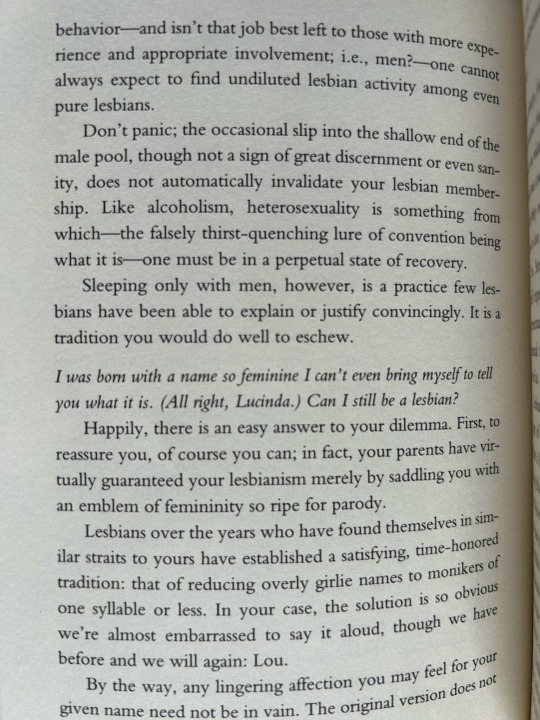
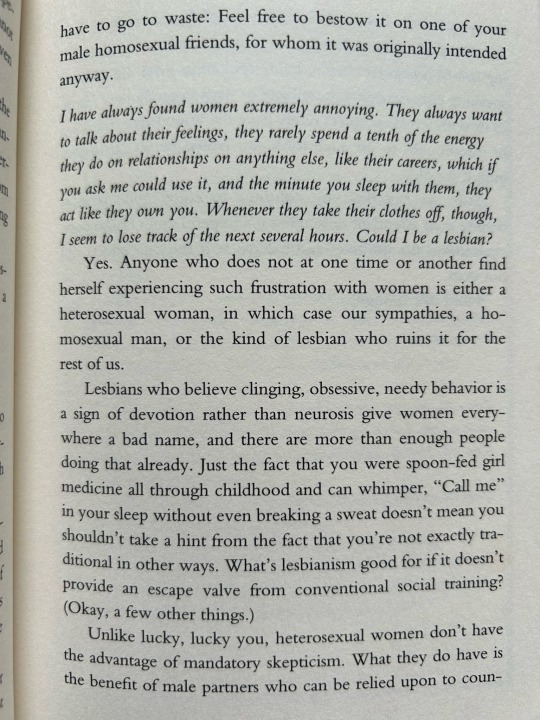
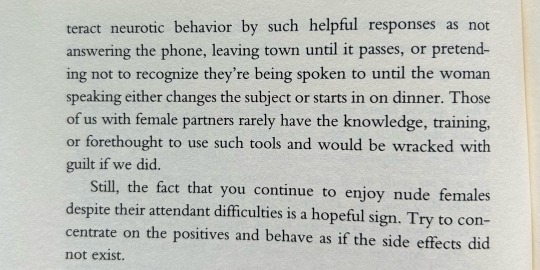
helen eisenbach, lesbianism made easy, 1996
139 notes
·
View notes
Text
Giant Masterlist of Cathar Facts (that I completely made up but nonetheless rigidly adhere to)
I am an unstoppable force and disney should have killed me when they had the chance (that chance was splash mountain when I was seven and as you can see I survived).
Under a break because it is way too long and covers really quite a lot, much of which I will probably never even need. But researching and writing this kind of thing is what I consider a fun afternoon so here we are.
General basic stuff
Cathar are basically felids evolved to fill a similar evolutionary niche to humans in the absence of any viable apelike species on their native planet, in the same way hyenas evolved to fill a niche normally occupied by canids.
They are pursuit predators but not terribly efficient ones outside their home planet. In terms of both speed and strength they can outperform humans on average in the short term, but have noticeably less stamina especially when it comes to running or walking long distances. They greatly outmatch any quadrupedal felids for stamina, however. (Mandalorians are an invasive species)
They run hotter than humans, around 100-102F.
Though height varies quite a bit, cathar are taller on average than humans and build muscle easily, making them extremely formiddable opponents in hand-to-hand combat.
The average face/skull shape of cathar is largely based on assumptions that they evolved under weirdly similar conditions to humans evolving from early hominids, aka shortening of the face, larger cranium, smaller mouth, etc.
While they are obligate carnivores and do have elongated canines, their teeth are more even in size than wild felids, and while they do still have barbed tongues, the barbs are relatively small/soft and more similar to a housecat than anything of comparable size (aka they won’t literally take your skin off if they lick you). They also have somewhat thinner skin than wild cats, though they are still more damage resistant than humans.
They do not have retractable claws because that’s not how fingers work, but they do have narrow, naturally pointed claws rather than humanlike fingernails. Many cathar choose to either dull them or file them down for convenience, but losing/damaging them, as per that one ambient dialogue on Dromund Kaas that I can never find when I need it, is extremely traumatic for them.
They have tails because I want them to, used for both balance and communication. Cathar tails are approximately lion-like, thin with a coarse tuft at the end regardless of markings (ie. a cathar with stripes won’t have a tiger tail), with the tip the same shade or a few shades darker than the darkest part of their coats. occasionally those from colder regions will have longer fur over the whole tail, or look like they don��t have a tuft due to longer fur overall.
Variation and a lot of bullshitting about genetics
Wookiepedia describes Cathar as “a planet of savannas and rough uplands” but I refuse to believe that all these habitable worlds are all one consistent climate/temperature across the whole globe. The weirdly ubiquitous infrastructure/cultural info I can kind of forgive since 90% of them were wiped out by Mandalorians and the rest left, and I’m charitably assuming there were a lot less than 7 billion cathar to begin with, so a lot of smaller or more isolated cultures across the planet were lost entirely.
They have less sexual dimorphism than SWTOR implies, though females are a little smaller on average and tend to have shorter/finer manes that are closer to their base color. In terms of relative strength/mass the difference is minor and female cathar are still very capable of fucking you up (the conventional assumption in the Empire that females are weak/docile and males are too uncontrollable to enslave is not remotely true in either direction).
Variation in fur/metabolism/ear and nose shape depends on which region/s of Cathar they come from (or their ancestors come from), but they don’t recognize different “races” the way humans do, particularly in the wake of the Battle of Cathar.
On average, cathar originating closer to the equator have shorter, finer fur, larger and more tapered ears, a tendency toward slender, lanky builds, and coloration that leans more toward golds/reds and higher pigment density. whereas those closer to the poles are much stockier and can be extremely fluffy, sometimes with an undercoat, with paler colors and less vivid/extensive markings. None of the above is universally true and cathar didn’t necessarily always stay in the region where their ancestors come from (and thus sometimes you get people like Riska, who is all limbs but has fairly northern features and entirely too much fur)
Cathar mostly left their planet in groups, so in some parts of the galaxy you’ll run into whole colonies that originate mostly from one part of the planet and have distinct appearances/cultural idiosyncrasies from other colonies.
They mainly follow the same general rules that apply to most felids in terms of coloration/pattern.
Markings can be stripes, spots, or less commonly rosettes (definitely some version of Taqpep variants) and mostly lie along Blaschko’s Lines, though it’s more obvious on some individuals than others and it isn’t always perfectly precise. Even spotted individuals usually display some striping on the tail and around the eyes, though not always.
“Default” coloration is black-based, with dark markings on a greyish or brownish base.
Countershading falls pretty much along patterns you’d expect and usually lightens the chest/stomach, lower face, palms/soles, and inner thighs. Specific distribution and patterns vary quite a bit, and sometimes express in odd ways (hence whatever is going on with Khatte). Darkest points tend to be the tail tip, nose bridge, and mane.
Genetically solid cathar are incredibly uncommon; much more common are genes that affect the appearance/distribution of markings, sometimes rendering them almost invisible. Even ones who appear mostly solid (aka Khatte) usually still have some faint striping around the face and/or tail.
Khatte is basically some loose equivalent of ticked tabby, which mostly just looks like weird countershading but leaves some faint striping on his face and tail.
Jial-ro’s coloration is the result of a gene that suppresses all eumelanin production, and a sepia-like form of partial albinism.
Riska has something similar, along with something that reduces the size/spread of spots.
Food
They’re mainly carnivorous and have different nutritional requirements from humans (similar but not identical to those of a cat), which can be a problem in places like the military where standardized rations are the norm. In the Republic a cathar can usually put in a request for rations designed to accommodate carnivores (or supplements, failing that), though they might have some trouble on more isolated or undersupplied planets. The rare cathar in the Imperial military have to procure supplements out of pocket, though it’s technically possible to get reimbursed for it if they’re willing to wade through the bureaucracy.
Cathar are perfectly capable of eating raw meat with few to no ill effects, and have a subgenre of cuisine centered around it (and while they didn’t invent sushi, they have enthusiastically embraced the concept). They also have plenty of ways of cooking meat and readily adopt any new ones they come across.
Their “natural” diet apart from meat mainly consists of fruit, root vegetables, and eggs, though the closer to the poles you get the less likely you are to encounter fruit in a dish. Cathar never cultivated grain and it holds no meaningful nutritional value for them, so bread, rice, and similar products simply do not appear in traditional cuisine. This does not stop some of them from eating grain products in small amounts, as they can still enjoy the taste, but it isn’t any healthier than processed sugar is to humans and they have a high rate of gluten intolerance as a species.
All cathar have a heightened and refined ability to detect savory/umami type flavors, but around 30-40% of cathar, and the vast majority of those from colder regions, have no taste receptors for sweetness at all. This has resulted in the cathar equivalent of the Cilantro Debate centering around desserts, even though they’re all perfectly aware that it’s genetic, and some who can’t taste sweetness still enjoy some desserts for the other flavors present. Those who do have sweet taste receptors are about as sensitive to it as humans, but it tends not to have the same addictive quality for them and a lot of them don’t like processed sugars in anything but small doses. They would appreciate a lightly sweet creme brulee but most of them would find soda absolutely disgusting.
Citrus is right out.
They suffer no more ill effects than humans from drinking alcohol, and due to generally having a fair amount of mass they can usually drink a lot of it.
Social minutiae
They use a fair amount of feline body language, particularly with others of their own species. While facial expressions play a part and they do smile, scowl, and generally express broad emotions, they have a reduced range of facial mobility compared to more humanoid species and no eyebrows to speak of, which leads to a lot of them having what humans perceive as resting bitchface. It also results in humans underestimating the range and depth of their emotions, and can be a problem in the medical field with human medics/doctors who haven’t been trained to work with less humanoid aliens and won’t necessarily recognize severe pain or distress.
Their ears are less articulated than a cat’s but still have some degree of mobility that serves more of a social function than a practical one. They also express a lot of emotion through their tails, to the point that it can be a detriment in some situations if they haven’t practiced consciously keeping control of it.
Bumping foreheads is a common way to express platonic/familial affection, or can be the equivalent of a chaste kiss between partners. They also squint and slow blink, though it doesn’t always translate clearly to other species.
They have a wider range of vocalization than humans; while their voices are often humanlike and they’re just as capable of articulate speech, they can also growl, purr, and make sounds outside human hearing range. Those raised among humans or near-humans tend to do this less, if at all, while cathar raised in more insular communities of their own kind can come off as very taciturn due to heavier reliance on nonverbal communication.
Sense of smell is much stronger and more refined than a human’s and plays a more significant role in how they perceive and navigate the galaxy. They can occasionally be mistaken for Force-sensitive by humans due to their knack for picking up on emotional distress or the presence of particular species/people by scent. This is more true with people they’re familiar with; they won’t pick out distinct members of the other species by default but will eventually be fairly reliable in identifying the scent of a friend or anyone else they spend a lot of time around.
The exception to the above is other cathar, who they can easily tell apart on an individual basis. They have scent glands around the jaw/neck that come into play for identification, conveying broad emotional states, in some situations can aid medical diagnoses, among other things. They also play a part in building connection and familiarity between friends, family, or romantic partners.
The ~horny section~
Cathar don’t really kiss the way humans do by default, but they can, and usually do so unless they’ve somehow had no contact with any near-human species at all. Their equivalent is gentle biting around the neck and jaw, which is another situations where the scent glands are relevant, and when aroused that whole area becomes an erogenous zone for the vast majority of cathar.
Plenty of humans (particularly if they don’t encounter a lot of aliens day to day) will avoid kissing cathar anyway because they have sandpaper tongues and dry mouths and fangs, and it feels fucking weird if you aren’t prepared for that.
They tend to be very bitey in general unless specifically asked not to. It only becomes a problem if the cathar in question is inexperienced with humanoids and hasn’t figured out how much bite force is acceptable for a species with thinner, more sensitive skin.
Their dicks are fairly humanoid in size and shape, though somewhat more conical at the head, but they do have a sheath rather than a foreskin. after maturity they don’t actually retract into the sheath more than about two inches when flaccid, and tend to be slightly less sensitive than the average human (same keritinization factor that affects circumcised humans). It also makes them more vulnerable to damage, but since it’s customary to wear pants on most civilized planets, that never really becomes a problem in the course of a normal day. The base of the shaft that’s usually covered has noticeably higher sensitivity. There are probably individual exceptions to most of the above.
Conventional understanding is that cathar don’t have barbs, which is true the vast majority of the time, though about 60% of them have some amount of vestigial non-keratinous bumps over their head that have no noticeable affect on anything aside from occasional increased sensitivity in that area. Rarely an individual might develop a few actual barbs at the onset of puberty, but they have no practical function and pose a risk of discomfort and injury, and can easily be removed via a fast and mostly painless medical procedure, so the number of adults who have them is close to zero.
Females do have (mild, easy to suppress if desired, and mainly not at all disruptive) heat cycles. Other cathar can generally tell by scent, but not to a distracting degree, and it’s considered rude and inappropriate to point it out with anyone but a close friend or partner. It should go without saying that males don’t have heat cycles, but I’ve gotten enough weird DMs about this to know that I need to say it. Unless said male is trans, and not on any sort of HRT, that’s not how that works.
They kind of have breasts but unless actively nursing they’re barely noticeable if at all, especially under clothing. Cathar have much fewer hangups about going topless regardless of gender than certain human cultures do.
94 notes
·
View notes
Note
saying "people who identify as girls are girls" is not simple. at all. i mean ok i am a girl. why? because i identify as one. but why? there's nothing that unites all girls. which doesn't mean that all girls have to be exactly the same but they at least need to have ONE thing in common. i mean if people say yeah i like women, when i'm in the street i look at women not men. how do you know? how do you know who's a man and who's a woman and who's anything else? and even woke people look at someone
1and think "girl" then think, or maybe they're non binary! but they never say or maybe they're a man. never. a person who looks like me has two options: girl or one of the hundreds of non binary identities. but to be a man, I'd have to try harder. it's not enough to IDENTIFY AS. ffs I can't be the only one who sees this. and just to clarify, i sent the joke about Emily being transphobic and i sent the first two of the three asks that you answered together i forgot this. you seriously thinl that if you raise a baby completely gender neutral, like one of those "theybies" and you tell them a girl is someone who identifies as a girl a boy is anyone who identifies as a boy nb is someone who identifies as neither, that they will deep down, without taking into account any stereotypes or biological essentialism, know what gender they are? even if they end up saying I'm a girl/boy, it will be because they will be exposed to girls and boys and "choose" the one they relate most to, or even because they like how the word "girl" or "boy" sounds.
I think you're asking some really good questions here. You're raising a lot of very philosophically interesting questions about the metaphysics of gender (what does it mean to have a gender, what does it mean to be transgender, is gender a social construct or is it innate to humans, etc) and how gender, as a social construct, impacts our lives on a day to day basis. Better philosophers than I have struggled with these questions for decades, but I'll do my best not to get too into the weeds on their different theories in this post. Instead, I'll offer my thoughts on what gender is and then investigate how we interact with it on a practical level. This is likely to be a long post, so apologies in advance, but it's a complicated issue that touches everyone's lives and I want to be mindful of that while writing this. Also apologies that this is going to be a pretty binary post. I don't mean to exclude nonbinary identities from this conversation, but to illustrate the points I'm trying to make, I think it's easier to talk about binary identities first. Just know that I do think nonbinary identities are real, valid and worthy of recognition and respect. Lastly, I'm not attached to any of the views expressed in this post. They reflect my thinking at this moment in time, but that might change as I learn more about these topics. I apologize if any of the views presented here are inadvertently hurtful. That's not my intention at all, but I recognize that regardless of intention, some things can cause harm. My goal in this post is to explore some ideas, and I would love to hear other people's opinions on this topic or criticism of these ideas. The Metaphysics of Gender So, to start out with, what is gender? Why are you a girl? Why do you identify as a girl? Why does anyone, and what links those people who identify as "girls" together? Is identifying as a girl enough to be one? These are complicated questions, both philosophically and culturally, and they've become more visible as we've become more culturally aware of gender variances (recently in the West. Third genders have always existed, and do continue to exist, in many cultures around the world). In biology and philosophy, there's a concept called "homeostatic property clusters" (stay with me here, I promise I'm going somewhere with this). "Homeostatic property clusters" is basically just a fancy phrase for the idea that if a creature has enough of a certain set of characteristics, they can be defined as part of a larger category, even if they don't have all of the traits that creatures in that category might have. In the PhilosophyTube video "Social Constructs", Abigail offers the category "mammals" as an example of a "homeostatic property cluster". Mammals are creatures that have warm blood, produce milk, and birth live offspring. Humans are mammals based on these characteristics, and so are seals and giraffes. But platypuses are also mammals, even though they lay eggs instead of birthing live offspring. These three properties, having warm blood, producing milk, and birthing live offspring, tend to "cluster" together, but they don't have to all be present in order for the creature to be "a mammal"- in this case, two out of three is fine. I think gender is similar. It's a homeostatic property cluster that includes biological, psychological, and social traits. Not all of those traits must be present for a person to "be a girl" or "be a boy", but enough of them have to be present in order for the person to be considered as part of that category ("girl" or "boy"). That cluster of traits is what all "girls" have in common, even if those traits aren't exactly the same for each individual. So, then, in the context of gender, what are those traits? "Biopsychosocial traits" is all very good as an academic term, but what does it actually mean? Let's start with the biological traits, since I think they're what most people default to when talking about gender. Biological Sex and Gender One trait we might consider when talking about whether someone "is a
girl" is sex characteristics. Sex and gender are fundamentally separate concepts, but for many people, they're linked. Many cis people consider themselves cis because they were "born in the right body" or lack the desire to medically transition. They have a "subconscious sex" that matches their physical body. So I think this is a good place to start. We might ask the question, "does this person have primary or secondary sex characteristics associated with being "a girl"?" It feels like the answer should be obvious- do they have tits and fanny, or don't they? But in reality, "biological sex" itself is kind of a homeostatic property cluster. Female sex characteristics include XX chromosomes, ovaries, estrogen and gestagen, a vagina, uterus, and fallopain tubes, breasts, and a menstrual cycle. But there are people without some of these traits that are still "girls". For example, some girls don't have a menstrual cycle (due to menopause, hormonal birth control, low body weight, PCOS, etc), but they're still girls. Some girls don't have a uterus (for example, if they've had a hysterectomy), but they're still girls. Some girls never develop breasts, but they're still girls. Some girls are born with Swyer syndrome, where they have a uterus, fallopian tubes, a cervix and a vagina, but have XY sex chromosomes. They're still girls. Any one of those traits by themselves can't be enough to decide if a person "is a biological girl" or "isn't a biological girl", but if a person has enough traits in that cluster, then they can be considered part of the larger category "biological girl". That by itself is kind of a TERFy take, so I would offer that the biological trait in the cluster "girl" is "has a cluster of female sex characteristics, either naturally or artificially, or gender dysphoria resulting in a desire to acquire those sex characteristics." But that alone can't be enough to determine if someone is or isn't "a girl". If it was, it would exclude pre-medical transition trans boys, even pre-medical transition trans boys who are living their lives as boys. It's also a transmedicalist take- it would also exclude trans people who never medically transition. To me, that doesn't feel right. People shouldn't be considered "a girl" or "a boy" based on biological essentialism, the pain of gender dysphoria, or their access to medical transition. So there have to be other factors at play- other traits in the cluster. Gender as Identity On the other side of the spectrum, some people say that gender is identity. You are "a girl" or "a boy" because that's how you identify- it's how you see yourself. In this viewpoint, gender is something innate to a person, that they instinctively know about themselves. It's perhaps a "female soul" in a "male body". In your ask, you express some scepticism about this view, and I'm inclined to agree. If humans have souls, I'm inclined to think they're not gendered, since what constitutes gender varies so widely across cultures and time periods. But I do also think that "identifying as" is an important element of "being a girl". Identifying as a girl is a basic criteria for being a girl. No person who doesn't identify as a girl can be a girl. It's an innate property of "girlness", the same way that an innate property of triangles is that they have three sides. But I do agree with you that I'm not convinced it's enough to only "identify as". Other traits in the cluster have to be present, because without a physical or social transition (or at least, the desire for a physical or social transition, particularly in cases of people for whom it's not safe or possible for them to transition), a person's identification doesn't have much practical value. Gender as a Social Role If "identifying as" isn't enough, then perhaps an important part of the gender conversation is the social role that gender plays in our lives. A gender is put upon us when we're born, and people continue to expect us to fill our assigned gender role throughout our lives. Maybe what's important isn't our body
parts or our internal identity, but instead, the gender role society lets us adopt. Perhaps society has to let you adopt the gender role you identify as. Either you're perceived as a woman or you aren't, either you "pass" or you don't. Perhaps those expectations that others have of you are what defines your gender. Intuitively, this seems to be tapping into something that feels true, at least to me. "Identifying as" isn't enough because society has to acknowledge that we are who we say we are. As you say, perhaps we have to "try harder" to "be a girl" or "be a boy" than just "identifying as". But this, too, has its problems. What about trans people who can't or don't pass? Does their transness get revoked for not appearing like they're trying hard enough? And what constitutes "hard enough"? Is trying at all "hard enough", or is there a point at which you "become" your gender? How many people need to reach a consensus on your gender before that's who you "are"? Does it get revoked by one person who misgenders you? And what about people who are cis, but occasionally put into an opposite gender role because of the way they present themselves? It seems to me that relying on other people to confer gender onto us is at once too limiting and not limiting enough. Gender as Gender Expression Going off of the idea of gender as a social role, then maybe gender is how you physically express yourself to the world- how you look to others. Maybe if you choose to express yourself as a given gender (through hair, clothes, makeup, voice, etc.), that's the gender that you are (or a reflection of the gender that you are), because that's how society will gender you. But that seems insufficient as well, for a lot of the same reasons that gender as a social role does. There are people who express themselves in stereotypically "masculine" ways but who identify as girls and who are understood to be girls by those around them. Their "girlness" is not culturally taken away from them based on their gender expression (unless there's another trait within the cluster of "being a girl" that they appear to not have). A girl can wear a full face of makeup, a dress and high heels, or have a pixie cut, no makeup, and wear a flannel and Doc Martens, but that alone isn't enough to say that she's not "a girl". This is especially true now, where very few ways of presenting are viewed as inherently gendered. Dresses and skirts are no longer exclusively "a girl thing" and pants have long been gender neutral. And what constitutes "presenting as a girl" and "presenting as a boy" changes across culture, time, and based on other characteristics an individual has (like class, race, size, or level of ability). So gender expression doesn't seem sufficient by itself to determine gender identity. Gender as Behaviors and Actions (aka Gender Performativity) Okay, so gender isn't just gender expression. But what about gender as a set of behaviors, something that you do? Gender performativity is a theory presented by Judith Butler in 1990 (sorry, I know I promised I wouldn't namedrop philosophical theories, but this is important to the conversation). Butler says that gender is constructed through a set of "acts" that are in line with societal ideas of what it means to "be a girl" or "be a boy". This performance of gendered acts is ongoing, even when we're alone, and is out of our control. Butler believes that there's no such thing as a "non-stylized" act- that is to say, everything we do is an act, and there's no such thing as an act that is not perceived as being somewhere on the spectrum of masculinity and femininity (at least, not in the current world we live in). The way we stylize these acts have the possibility to change over time. So Judith Butler believes that we "do" gender rather than "being" gender- that a girl "does girlness" over time. Put another way, a girl does behaviors, actions, and expressions that are stylized as "girly", which is what makes her gender identity "girl". And this gender, "girl", is constantly being
produced as the girl produces more of those "girly" acts. Instead of having an innate gender or expressing our internal gender through the way that we present, Butler thinks our outward gendered acts create our inner gender identity. Those acts and the way we perform them are shaped from the minute that we're born, when we're thrown into a pre-existing gender category and taught that "people like us" do things "in this way". This theory offers an answer to the question we asked in the previous section about gender as presentation; someone who is dressed "masculine" can still be "a girl" because they're performing "girlness"- they're doing acts that are in line with what we think of as "a girl". Because Butler doesn't believe that you're born with an internal gender, her work is controversial in trans spaces and are sometimes thought of as being trans-exclusionary (although Butler herself is a trans advocate). But I think disagree. Presumably, a person could change the stylization of the acts they perform. A person who was performing "boy" can begin to instead perform "girl", although they did not grow up performing "girl". It may be difficult, as they haven't had the performance of "girl" thrust upon them their entire lives, and have not experienced the "oppression experiences of girlhood" that can shape the performance of "girl". But gender performance and gender socialization are a lifelong process, and so the more a person "does girlness", the more they will be perceived as "doing girlness", and the more they will be expected to "perform girlness." I think it becomes something of a feedback loop where performance feeds socialization and socialization feeds performance. What about the "theybies"? What would happen if you raise a baby completely gender neutral? What would happen if a baby wasn't thrown into a pre-existing gender category upon birth? Would they identify as a gender without taking stereotypes or biological essentialism into account? This is essentially a question about social constructs. If we raised a baby with the understanding that some people have male sex characteristics, some have female sex characteristics, and some people have a combination of both, but removed the social constructs we have around gender, would gender still exist to this child? What you've created here is a "Twin Earth" thought experiment- a hypothetical where there are two Earths that are identical in every way except for one. Our Earth has the social construct of Gender, but Twin Earth does not. Would our Theyby still have a gender if they lived on Twin Earth? I think no. They wouldn't have a context to understand the social systems that we've created around sex characteristics, and so they wouldn't be able to place themselves within those systems. They wouldn't understand why we've based our whole society around sex characteristics as opposed to something else. They would be able to identify that they have the sex characteristics associated with "boys" or "girls", but not what it means to "be a girl" or "be a boy". (If you want to dig further into this idea of Social Constructs, that PhilosophyTube video I linked above is a good place to start). They could learn, but it wouldn't be innate to them. We, however, don't live on Twin Earth. We live on Earth. And on Earth, we do have the social construct of gender. So even if you raise a child completely gender neutral, they still have a concept of what it is to "be a girl" or "be a boy". They might learn that "girls" have long hair, or wear dresses, or are nice and caring, or are emotional, or walk and talk a certain way, or wear pink, or whatever other social constructs we ascribe to the gender "girl". They might learn that "boys" have short hair, wear pants, are mischievous, are aggressive, or walk a different way, or wear blue, or whatever other social constructs we ascribe to the gender "boy". Kids who are raised gender neutral look at the physical characteristics of other kids, the gender expression of other kids, the performance of "girlness" or
"boyness" that other kids do, and compare them to the physical characteristics they have, the gender expression they like, the gender expression that's expected of them from others, the performance of gender that they gravitate towards, and the performance of gender expected of them from others, and they tend to pick the one that feels more like their category. Most kids start conceptualizing their gender identity around age 3 or 4, and that's true for kids who are raised gender-neutral as well. When they start spending more time out in the world, they notice that they're different from some kids and similar to others, and they learn the language to describe those differences. But all of this is kind of beside the point, because raising a child as a "theyby" doesn't ultimately have the goal of the child not having a gender or growing up to be agender or genderqueer. It has the goal of allowing children to develop their likes, dislikes, and views of themselves without the contribution of harmful gender stereotypes. And I think that's actually a really great goal- how many of us that were raised female were discouraged from pursuing certain interests (especially science and technology related interests) because those "aren't girl things"? Kids will be exposed to those harmful stereotypes eventually, but if a kid is raised until age 3 without them, they might be more resilient to them when those ideas are presented. And for kids who do end up being transgender, being raised without gender lets them know that they'll be accepted by their family no matter their identity. Okay, but give us some answers... what is gender? So, we've gone over a lot of things that gender isn't, or at least, a lot of things that can't exclusively constitute a gender. But where does that leave us? What does that make gender? I propose it's something like the following: There are lots of ways to have or experience a gender. In order to have a gender, a person must:
1. Identify as that gender and: 2. have a cluster of sex characteristics matching the biological sex associated with that gender, either naturally or artificially, or gender dysphoria resulting in a desire to acquire those sex characteristics AND/OR 3. socially inhabit that gender, through gender expression or gender performance, or have a desire to socially inhabit that gender
I think that covers pretty much every case I can think of. People who identify as a gender and have the sex characteristics matching that gender are cis people, regardless of their social presentation. People who identify as a gender and have gender dysphoria or who have medically transitioned are the gender they identify as. People who identify as a gender and socially inhabit that gender are also the gender they identify as, and so are people who identify as a gender and would like to socially inhabit that gender but can't due to financial constraints or safety concerns. They're just experiencing trans identity in a different way to medically transitioned people. Gender as a Social Construct Okay, so that's the metaphysics of gender, or at least, an approach to the metaphysics of gender. I want to make it clear that I'm not attached to this theory, and I don't necessarily think I'm right. This is just where I've landed in my thinking right now, and I'm open to hearing other people's opinions and criticisms. In any case, it's very abstract, very philosophical, but maybe not super practical for the other questions you're asking here, and definitely not simple. So why, in my original answer, was I making the claim that "people who identify as girls are girls" is simple, then? I was making that claim because the way we interact with other people isn't metaphysical. It's practical. And practically speaking, all you need to do is acknowledge a person the way they ask to be acknowledged. Does someone say they're a boy named Jack who uses he/him pronouns? Great, call him Jack and use he/him pronouns. Does someone say their name is Sarah and use she/her pronouns? Great, call her Sarah and use she/her pronouns. Does someone say their name is Alex and they use they/them pronouns? Great, call them Alex and use they/them pronouns. Does someone say their name is Cloud and they use ze/zir pronouns? Great, call them Cloud and use ze/zir pronouns. You don't have to understand their relationship with their gender or what their gender means at all. You can even think their gender is "cringe". But you do have to respect the way they view themselves, and acknowledge them how they want to be seen. Think about it this way- if you were at an event and someone had a nametag that said, "Hi! My name is Taylor", but when they introduced themselves, they said, "I know my nametag says Taylor, but actually I go by Riley," what would you do? You'd just... call them Riley, right? You don't need to know why they have the wrong nametag to respect that their nametag is wrong. You probably wouldn't insist on calling them Taylor because that's what the nametag says. You probably wouldn't even ask how they ended up with a nametag that was wrong. Trans people are people, and they deserve respect just like anyone else. That's why this is simple- all you have to do is listen and be respectful, even if you don't understand. Wrapping up, here's my question to you. What is it about trans people that makes you uncomfortable? Think about it honestly, and try not to default to, "it's political correctness run amok! People are offended if you breathe too loudly!" Does it feel like a challenge to your own identity, either your gender identity or your sexuality? Is it a discomfort with society changing? Is it a fear of getting something wrong and offending someone? The vast majority of trans people I've met just want to be acknowledged for who they are. They'll politely correct people who misgender them or accidentally say something transphobic. And the ones who are the most aggressive or militant are the ones who have been hurt the most by a system that won't acknowledge them for who they are. It's a plea to be seen in a world that denies them that visibility. Maybe it isn't trans people that need to become less sensitive, but us who need to become more accepting. Some resources that you might be interested in if you liked this post: The Aesthetic | ContraPoints Social Constructs | Philosophy Tube "Transtrenders" |
ContraPoints Gender Critical | ContraPoints Judith Butler's Theory of Gender Performativity, Explained
14 notes
·
View notes
Text
How Archive Sunday turned 5,000 TikTok followers into $1 million in revenue… in one year
Nothing has made me feel the big 3–0 looming on my horizon more than being a millennial on TikTok. Like more than the 100 million people who downloaded the app at the start of quarantine, it was something I used to pass the time. It was what all the kids were doing, and I was in strong denial about the fact that I was no longer one of them with my skinny jeans and side part―which TikTok has shown me are signs that I am now, certifiably, Old.
What I expected was videos of lip-syncing and dancing―like the app’s precursor, Musical.ly. But what I found was a collection of content creators making videos about my very specific and very niche interests and using that as a marketing tool for their small businesses.
I found a lot of small businesses on TikTok to satiate my quarantine-induced shopaholic tendencies. Like custom joycons for my Nintendo Switch, Japanese anime stickers for my laptop, and cute gear for my battlestation (otherwise known as my home office). What I didn’t realize was that I wasn’t alone-the pandemic had kickstarted an explosion of growth for small businesses on apps and websites like TikTok.
And one of those businesses is right here in Salt Lake City-in fact, right across the street from my very own apartment.
Just because there’s a pandemic doesn’t mean you can’t do business
When I was downloading TikTok at the start of the pandemic, Sasha Sloan was starting her business. “I was just kind of stuck at home in quarantine,” she says. “I was still in school, but I couldn’t go to campus. I couldn’t get a job. And like everybody else, I was just on TikTok all the time.”
What started as a way to make some money and kill some time in quarantine quickly became an overnight sensation.
Her business was simple: buying old Star Wars T-shirts from the thrift store, bleach dying them, and reselling them on Etsy. Coming from a family who had made their living off of recycled fashion, like her siblings’ company Uptown Cheapskate or her mother’s company Kid to Kid, it was an easy model to follow, but one she did all on her own.
With only 5,000 TikTok followers and 50 bleach-dyed Star Wars T-shirts, Sloan put up a video showcasing her product and went to bed. When she woke up the next day, her entire Etsy collection had sold out. “That was the first moment that I was like, hold on, do we have something special here? And then I did it again.”
For the first two months, that’s how it went. Waking up at 6:00 AM, buying shirts, bleaching them, photographing them, and then listing them. “I couldn’t do it fast enough,” she says.
Sloan launched her business, Archive Sunday, with bleach-dyed T-shirts on TikTok on July 7th, 2020. By August, she’d launched her second product: collage walls. One hundred days in, the business hit $100,000 in sales. By the five-month mark, Sloan’s account reached one million followers. Now the business is projected to make a million dollars in sales in 2021.
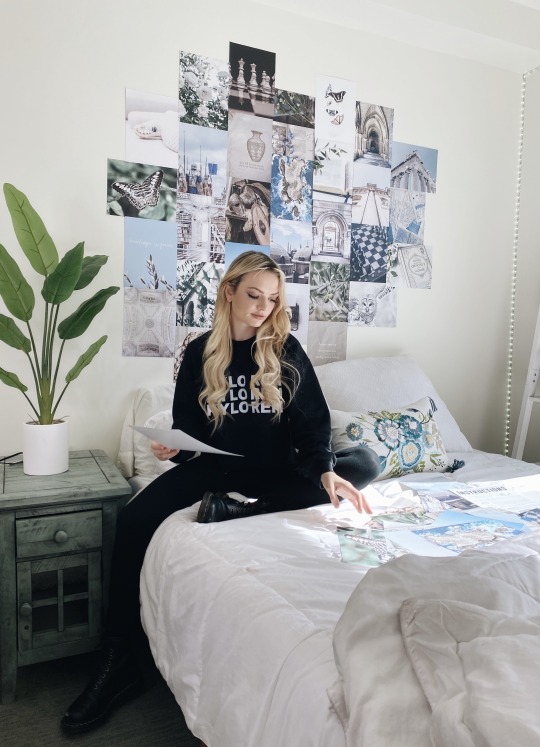
Pictured: Sasha Sloan with the Archive Sunday collage kit, Athena. Photo provided by Archive Sunday.
A new social media for a new way of marketing
What makes Sloan’s business unique is that it goes beyond traditional methods because the products she sells draw on existing fanbases, like Star Wars and Harry Potter. In fact, I discovered her months ago because she posted a video from my own favorite fandom, Sailor Moon.
“The [TikTok] algorithm sorted me very quickly into fandom. Star Wars, Harry Potter, all that kind of stuff. And I was just watching and seeing how easy it is to go viral,” says Sloan. She’s right. It is easy to go viral on TikTok, especially if you know what you’re doing.
The algorithm sorts users into social circles that share interests — or liked hashtags. When a video is uploaded, the algorithm shows it to a small subset of people. And when they like that video, it shares it with users who may have similar interests. And if they like it, it creates a positive feedback loop that, if it happens enough times, causes the video to go viral. Unlike platforms like Twitter or Facebook, you don’t have to be following the video creator to find their content.
And though it sounds lucky, Sloan says her success was about more than luck, “Everything that’s happened on TikTok is not by accident. I am very strategic, very calculating in what I post,” she explains. “That’s something that I think is the most common and frustrating misconception to me is that I am a blonde girl. I’m a pageant girl. I know how to do my makeup. And I will get the critique that everything I have only came to me because of the way I look. And I just hate it, because I don’t think people realize I’ve been working in the social media world and studying algorithms since I was about 18.”
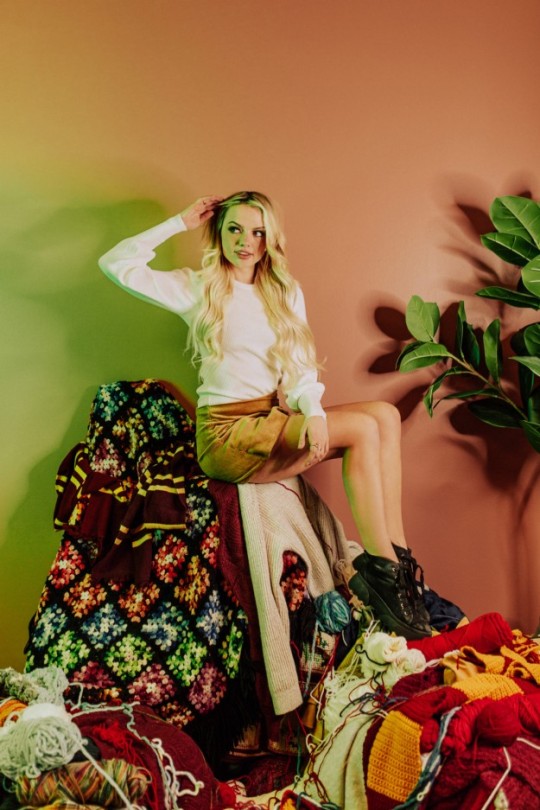
Pictured: Sasha Sloan in her signature collection, The Burrow, inspired by Harry Potter. Photo provided by Archive Sunday.
Sloan has worked in social media since she ran the verified social accounts for her family’s businesses as a teenager. Recently, she even ran social media for John Huntsman’s campaign for governor as part of her capstone internship, managing million-dollar ad spends. And in her experience, she can confirm that marketing on TikTok is very different from Instagram, Facebook, or Pinterest.
“[TikTok] has created this liberation in social media where, number one, you can make whatever you want because you’re speaking to an audience that really gets you and has your same interests. And number two, it is a meritocracy. On Instagram, celebrities are often the most-followed and your followers decide how much [your content] gets liked. Whereas on TikTok, the algorithm does not care if you have a million followers or if you have ten. The only question is, is this a good piece of content?”
Creative advertising for a creative generation
TikTok is changing the game―and it’s changing the way we sell products. It’s not about paid advertising, because you can scroll right past the ads. You can’t target an ad to Gen Z the same way you can target a Boomer on Facebook. And according to Wallaroo Media, 60 percent of TikTok users belong to Gen Z, who’ve spent their whole lives on social media and are able to tell what’s an ad and what’s actual content. So if you want a TikTok user to watch your ad, you have to make it content they want to watch.
So Sloan has skipped the commercial. “I’ve never spent a dollar on marketing,” she says. “We just make these creative projects and people want to support them. They want to support the outfits. They want to look like our characters. And so we’re almost using fictional characters as influencers in a way.”
The creative projects and fictional characters she’s talking about tie back into her Noble House of Black series, which is a fan-created, live-action series of TikTok videos about three sisters from Harry Potter: Bellatrix, Andromeda, and Narcissa Black (played by Sloan herself). The series tells the story of these sisters in a visual form of fan fiction, wearing Archive Sunday’s clothes and using their accessories which, if fans like enough, they can follow through Sloan’s TikTok profile to the Archive Sunday store.
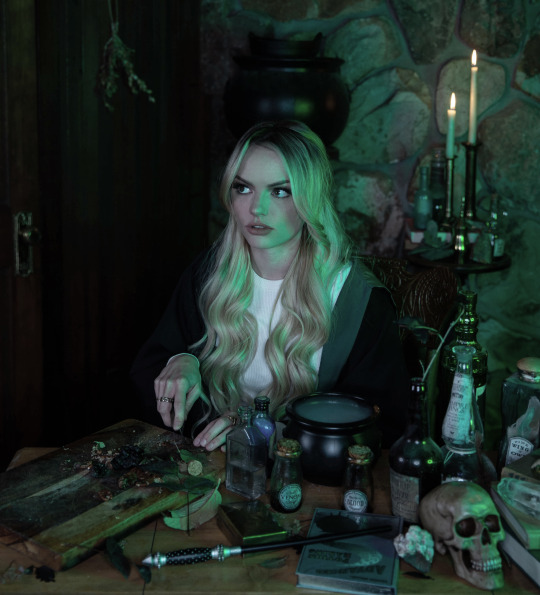
Pictured: Sasha Sloan as Narcissa Black in the Tiktok Harry Potter fan series The Noble House of Black. Photo provided by Archive Sunday.
What makes the series so engaging is that they’re featuring characters the very large and very vocal Harry Potter fandom is already familiar with. But while these characters exist in the Harry Potter franchise, much of their story is left untold. Which leaves it to the interpretation of fanon — a collection of concepts and ideas that are used in most fan fiction, but don’t really exist in the real story’s canon. And that’s where the Noble House of Black steps in to fill in the story.
“We are representing the aesthetic of fandom, which is not exactly the same thing as representing the original piece of art or work,” explains Sloan, who is very careful to circumnavigate her business around copyright issues. “We’re not copying and pasting the original piece of art. We’re using that art as a launching pad and an expansionary work to create something [new].”
A new kind of business for a new kind of nerd
The business of fandom, and namely fan fiction, is growing. Comic conventions like Salt Lake’s FanX grow bigger every year. The most well-recognized fan fiction website, Archive of our Own (AO3), even celebrated their 7 millionth fan fiction upload in 2020. Fan culture is a booming and underserved market, which has exploded even further with the stay-at-home orders of the 2020 pandemic. And Archive Sunday is capitalizing on it.
The untapped market of grown fans, particularly young women, is what Sloan attributes to her success. “I wanted to create a brand for that girl who is a millennial or a Gen Z or who loves their fandom stuff, is confident, put together, and is still a cool, popular, fun person that you’d want to hang out with.” For the girl that shops at Target, who wants the $200 merch from Disneyland but can only afford the sale at Hot Topic. For the fan who wants to rep their Hogwarts house while also being office-appropriate.
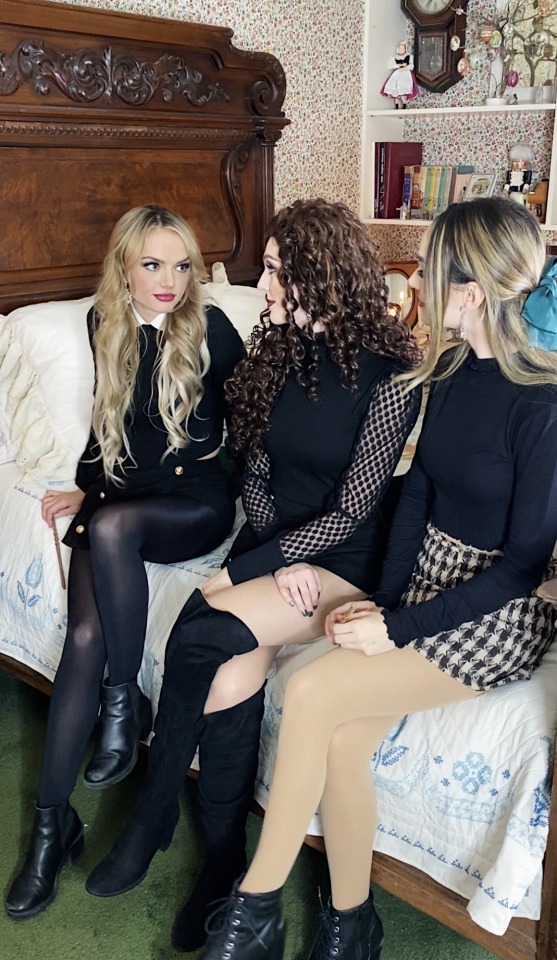
Pictured: The Black sisters from the Tiktok Harry Potter fan series, The Noble House of Black, with the actresses wearing signature Archive Sunday clothing pieces. Photo provided by Archive Sunday.
And Sloan is using her platform not only for marketing but as a tool for empowerment. “Generally in society, women are made fun of for their interests,” she says. “And I think that a lot of young women, in particular, need and desire the ability to look up to other women that have the same interest and are completely confident and passionate about it.”
And as a grown fan myself, I wholeheartedly agree with her. According to a census survey of 10,005 AO3 users, 80 percent of fan fiction readers and creators identified as female, with less than five percent identifying as male. But how many of these women hide behind online aliases and compartmentalize their fandoms from their real lives?
The answer to that question remains unseen, but Sloan is taking the steps to embrace her nerdiness as the girl who reads too much―and turning that into not only a business, but a positive role model for young women.
“When people message me to tell me why they follow me, it’s usually young women who [say], ‘I’m getting bullied in school and everyone thinks that I’m weird. I like all this stuff. I’m so passionate about my books and things. And I don’t really see any representation for that.”
So she’s filling the gap. Embracing her inner geek and using that to connect with other fans, she’s been able to build a business practically overnight. There’s a market here that’s ripe for the picking and desperate for content. Like Sloan, you don’t need to spend a dime on marketing. You just need to be a little creative and jump in the game while it’s still hot.
...
Originally published at https://www.utahbusiness.com on April 27, 2021. Follow me on Medium!
#harry potter#tiktok#ao3#fanfic#house of black#narcissa#bellatrix#andromeda#sirus black#black sisters#small business#utah#my writing#journalist#article
8 notes
·
View notes
Text
Fashion Analysis: Nancy’s Purple work dress and Others Part 2
We’re back! We examine how Nancy’s dress stands as a beacon of great (admittedly mostly white) feminist hope, Karen Wheeler passes the torch in a consciousness-raising session, and we explore how purple has been used in other period pieces.
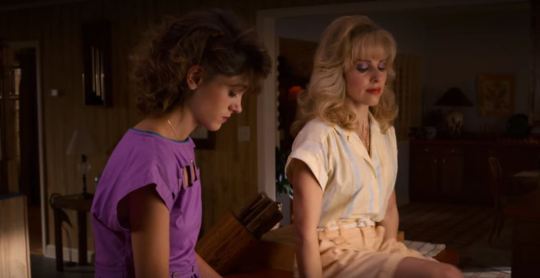
Nancy has been no stranger to purple before, wearing it as a symbol of her passion, youthful innocence, and heightened emotion. She wore it in the library when she thought she saw Barb (despite the knowledge that her best friend died) and she wore it the day that Steve invited her for a get-together at his mansion (with a pool!) and it’s something that she promptly changes out of before getting in the deep v-necked, chevron striped sweater to look a little more sexier.
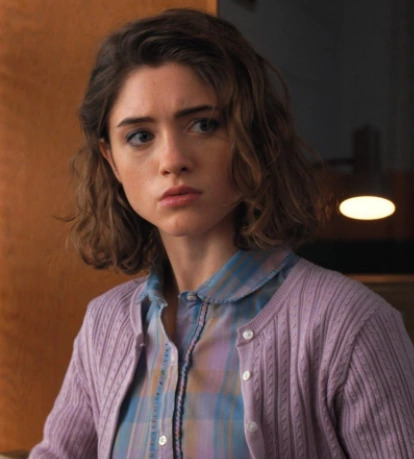
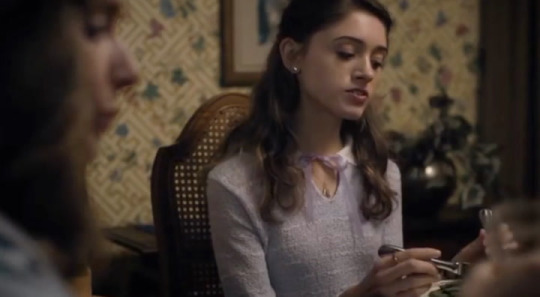
Now the purple is no longer pastel, it’s a saturated lilac that is updated for the times and reflects how she is no longer the naive girl in a ballet slipper necklace. After she talks about her struggles in a misogynistic office with her mother, her mother begins to open up, in colors that look subdued but symbolic (except for the makeup).
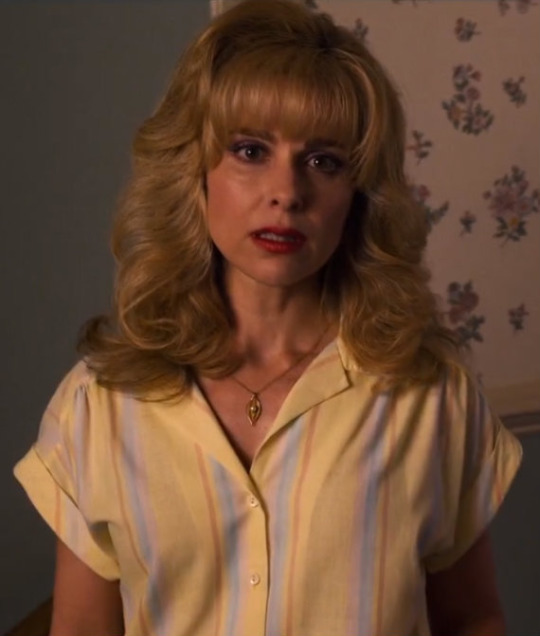
First check the colors: lavender tones and yellow. Purple on her eyelids. Put a pin those colors (I want to note that a bold red lip remains timeless) and that necklace. We are going to explore the mystique of Karen Wheeler: Model 1980s Housewife and peel some layers with the help of some other ladies in period pieces and her exposition.
We learn that it was likely Karen Wheeler had her own dreams aside from the conventional and traditional life she leads as a bored housewife (who got close to adultery) until casual misogyny led her to abandon those dreams presumably because she “wasn’t smart enough” or “good enough” and stopped trying. Some other ladies (also with incredible hair) would relate outside of the series.
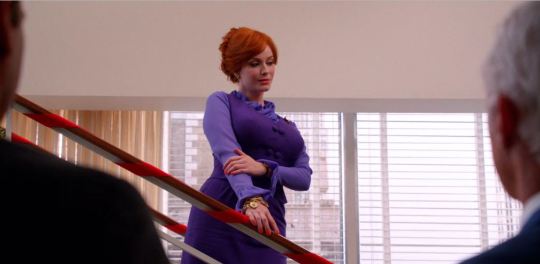
A savvy bombshell who had to negotiate sexism to get what she wanted, until she left men behind for now.
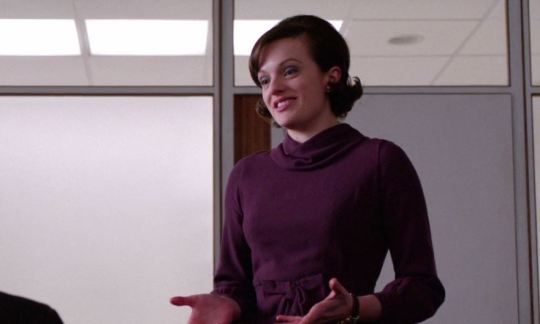
A young woman in her own bold shadow giving the news to her (unappreciative) boss that she is leaving for better things.
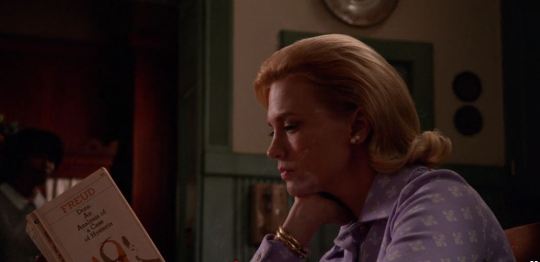
A conventional wife and mother who always relied on her own beauty to get the attention and praise she needed and made the radical choice to go back for a Master’s degree.
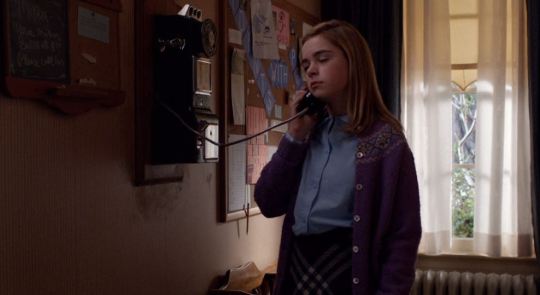
A disappointed young girl in sensible (and feminine) cardigan and button up shirt listens to whatever a male relative is trying to tell her.
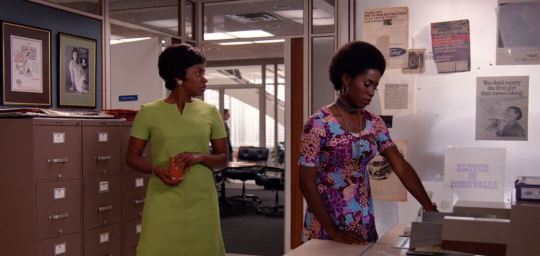
Two secretaries are reminded vividly of how disposable they are in a white male patriarchy but cannot confront the men themselves.
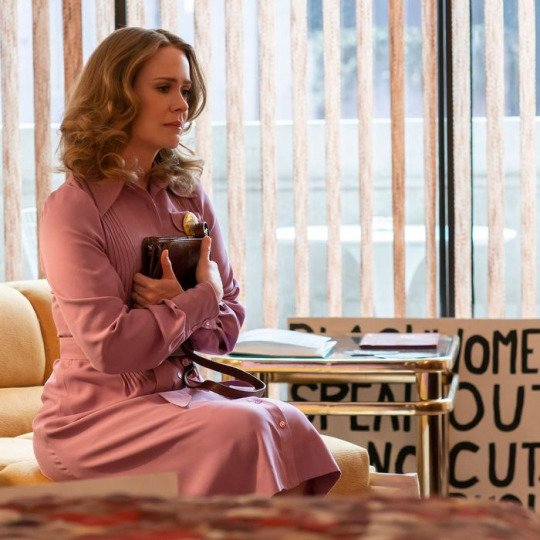
A sheltered proud homemaker questions her life choices as she is surrounded by women who insist on making bolder moves for their lives and change society for all women. She also finds she is very naive to how life works.
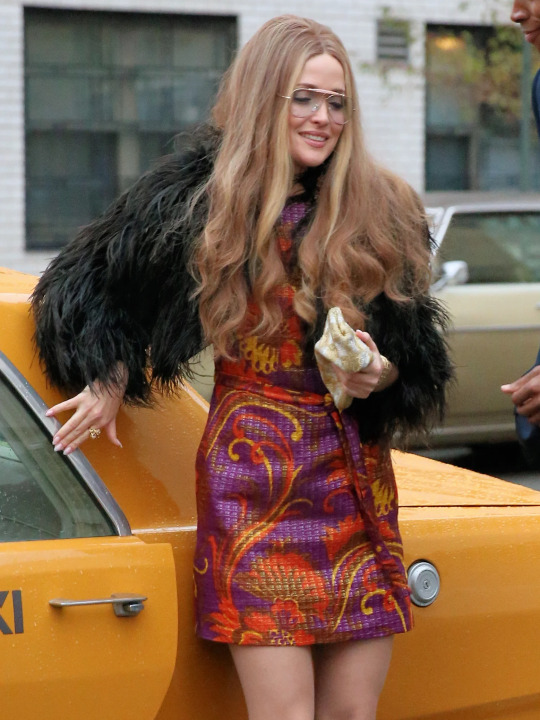
A woman who is renowned for her beauty and glamour fights to be recognized for her skills and intellect, tries to bring different people together, and is willing to confront authority figures on their wrongdoing. She also questions why a woman can’t be considered both beautiful and intelligent.
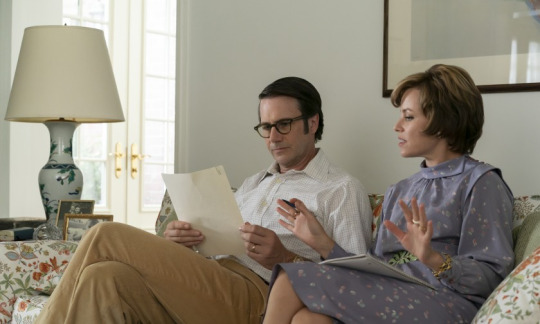
A hardworking wife and mother tries to use her influence to improve the status of women and manages to fight anti-feminists while enjoying tea time with her daughters and their friends. She is also challenged with expectations for how wives were “supposed” to behave.
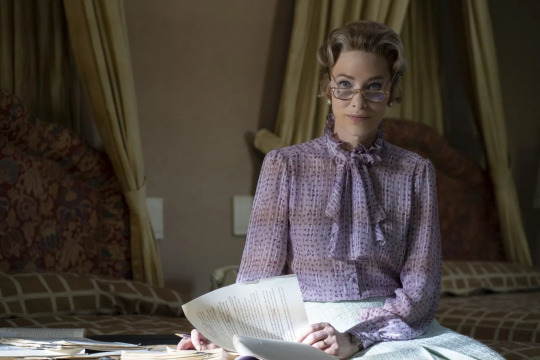
A woman, with a impenetrable veneer of perfection, attempts to negotiate her way to patriarchy by exploiting the image of traditional feminine perfection and keeping women's’ status, well, static. She loses out when she sees that no matter how many bodies she shoves under the bus, the men above her do not appreciate her efforts on their behalf.
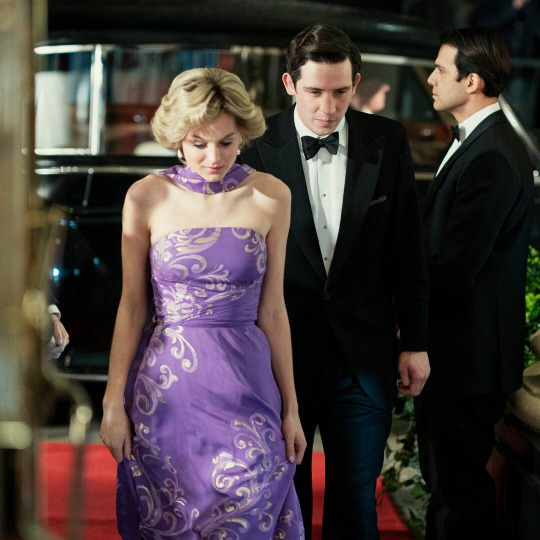
A young and beautiful princess grapples with issues of being a trophy wife, mother, her own roving eye after a marriage to a much older (and unappreciative) patriarchy, and her yearning to be her own person.
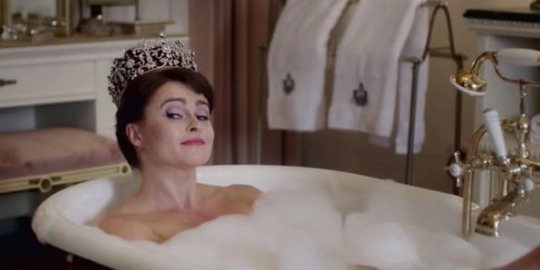
A princess goes bold with her makeup, hair, and clothes to gain the attention she has been socialized to expecting. Trying to be a bombshell and “with it” while dealing with a crumbling marriage, feeling overshadowed by others, and no positive outlet for her intelligence.

A vivacious and stylish housewife grappling with the painful realities that men can be fickle and that gender roles don’t offer women any outlet for their ambitions or a safety net for when things get really bad, she learns she will have to make bold choices to better her circumstances.
All these women, like Karen, have made choices to survive the patriarchy and live life on their own terms. Some succumbing to the patriarchy, others revolting against it, and one who would betray others to win her seat in the boardroom. Many of these women are/were noted for their beauty only to find that other people (men) didn’t expect them to be insightful or smart; some of these women were wives and mothers who loved those roles but chafed at the idea that they’d give up their autonomy and individuality to be excellent at those jobs; a few came into motherhood and marriage rather young, before getting to experiment and mature their way through girl’s trips, work, and messy experiences. And many of them chose a different path for themselves aside from being a domestic and maternal figure, probably swearing off it for their own reasons. That was (and still the reality) of many women in Karen’s generation especially. Those were the options open to her and she chose the option that seemed to reap the most benefits.
Now about Karen’s sartorial choices? First the necklace.
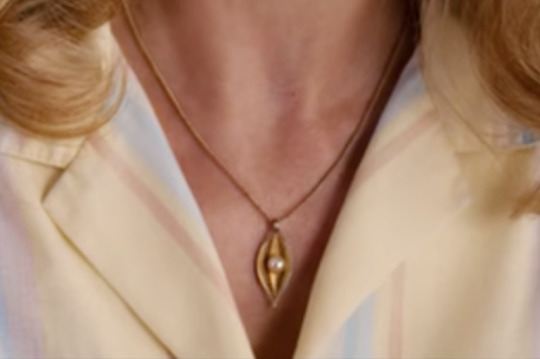
As noted in Seventeen magazine, many fans on the internet noticed the shape her necklace took, looking similar to a vaginal opening with the pearl as a clitoris. Given how heavy the male gaze was in the 1980s, this was a impressive expression of female sexuality. Given the look and symbolism (given added weight from the feminist pep talk she gives Nancy), it’s quite impressive for the conventional PTA mom whose front lawn held a Reagan/Bush ‘84 sign (just look up their policies on reproductive health and sex education, I recommend Gloria Feldt’s The War on Choice: The Right-wing Attack on Women's Rights and how to Fight Back). Then we go from Second Wave Feminism of the prior decade all the way back to First Wave Feminism’s use of White, Purple, and Yellow.
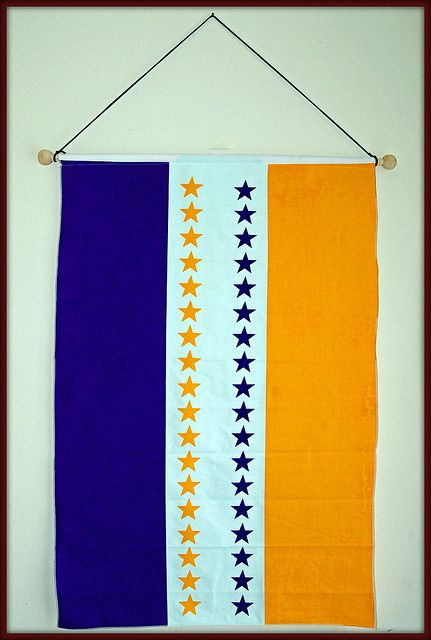
White dresses stood out against men in their dark suits and were cheaper to maintain (laundry practices at the time caused colors to run) and reflect how white mainstream figures of the movement really were, after all Nancy and Karen are upper-middle class, white, cishet, conventionally attractive preppy suburbanites in Indiana and their experiences wouldn’t 100% match those of transgender women, working-class women (Joyce), women in abusive households (Max), traumatized women (El), women of color (Erica), larger or “outlier” attractive (Barb), or lesbians (Robin).
Gold/Yellow stood for “Hope”, Purple for “Loyalty”, and White for “purity” (given that name “Karen” means “Purity” from Nordic origins, it’s pitch perfect).
Hope and Loyalty embody the Party of Stranger Things, as to why Purity isn’t mentioned here, we will go in the 3rd part (all the racial implications can be looked up) and see the group get intersectional.
#Stranger Things#The Crown#The Marvelous Mrs Maisel#Mrs America#Mad Men#1980s Fashion#costume analysis#period costumes#fashion analysis#feminism#Nancy Wheeler#Karen Wheeler#Purple#Intersectional Feminism#Alice Macray#Joan Holloway#Peggy Olson#Dawn Chambers#Shirley Mad Men#Betty Draper#Sally Draper
28 notes
·
View notes
Text
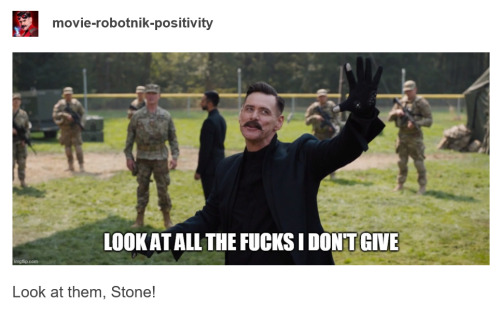
Yeah, no fucks to give here!
Really not into this ship - at least not in a romantic & sexual context.
—
At this point, I think it is best, if I put a little clarification here, before I continue:
This is just about my personal opinion, theories & headcanon - and by no means lays a claim to general validity (nor does your POV, btw).
I have more of a pick & choose approach to fandom subjects, anyway, so I can customize the experience exactly according to my needs and wishes. This is fiction, after all - the realm of endless possibilities - where anything goes, and where there is a place for the preferences of all of us.
That said, I really want to point out that I have nothing against people shipping the Dr. with Agent Stone - but since I, personally, prefer m/f ships, I’d rather choose the female OC approach, as it’s also my beloved villain x heroine constellation (not the subject of this post, though).
My take on the dynamic between the Dr. and his assistant is, therefore, quite a bit different from the fandom popular one. Well, to each his own.
What this post definitely is not, is an invitation for a debate regarding character interpretation, shipping choices, etc. - and all the potential drama that this might entail. If that is what you’re after, then I’d politely ask you to leave now, because all you are doing is wasting both of our time.
Let’s just agree to disagree and move on, k!?
I do my thing and you do you, guys!
I suppose, I made myself abundantly clear now.
—
Anyway, to return to the topic …
Where have all the male friendships & professional partnerships in fandom gone!?
Because, personally, I think agent Stone rather relates to his boss on that level…
Robotnik being a role model of some sort, that is - not unlike a kohai & senpai, or a younger & older brother constellation, actually - where the former looks up to the latter due to certain traits that he admires (and Stone certainly does). Regarding the age difference of the two, this could also make sense.
I’d estimate that Stone can’t be much older than his mid-twenties at most, since he’s in the position of a junior agent and assistant - still at the very beginning of his career path. And he’s very capable, disciplined and professional, at that, which is probably why he made it as Robotnik’s assistant at all (unsurprisingly, given the man isn’t the most patient).
Speaking of whom - I think, regardless of Jim Carrey being in his late fifties at that point - he, himself, can’t be that old, actually. My personal take (& preference) here would be late thirties, which would still make a lot of sense regarding his academic and occupational career. Being this overachieving genius, I guess that he finished school in time-lapse mode, skipping one, or even more grades - same goes for uni. Therefore, it wouldn’t surprise me if he was done by the age of 25 - his five PhDs included (bet he did two at once), which would still give him plenty of time to make his way as an agent and scientific government official up to the time of the events of the movie.
Aside from that, I can’t help but see parallels to the dynamic of Piett and Vader here, as well - a mixture of professional esteem and a bit of intimidation. But certainly no outright fear, as Stone is hardly under the threat of being strangled to death by his superior, like poor Piett is.
That is not to say that Robotnik’s still frequent misconduct towards him is ok (it definitely is not), but it certainly is more mild than he behaves towards, say, pretty much anyone else. Btw, that includes the “pin yourself to the wall”, grabbing him by the bottom lip and dragging him towards himself, while glaring at and chiding him (For what exactly!? Not being perfect, or as smart as him!? Chill, man, the boy is doing his best, and he’s doing a good job!).
Fandom, of course, does what it always loves to do - construe this as “evidence” for the alleged attraction between the two, which is pretty far-fetched, imho (…although you’re surely free to interpret it this way, if you so please. As I said, this is just my pov & to each his own. *shrugs*).
Anyway, you can clearly see Robotnik displaying this type of behaviour, along with the invasion of personal space, towards other male characters as well - be it “Major Nobody Cares”, “Officer Brainfart”, the big bar dude he threw out of the window, or Tom Wachowski. So, following this line of argument, does that mean he’s into these guys, as well!? Honestly, that’s pretty ridiculous!
If anything, it is a blatant display of asserting dominance, bringing the message home that he is the alpha male, while putting his opponent / subordinate in his place - and that’s it! What this behaviour definitely is not, however, is something remotely shipping related.
Besides, there are many examples of other male characters doing this for similar reasons, too - amongst others Darth Vader (remember that scene between him and Orson Krennic!?), and Severus Snape (after Harry invaded his memories during the occlumency lessons). And Robotnik does that quite aggressively in the cases above. In fact, it seems to be a fairly consistent behavioural pattern with him (not that he actually needed that though, but that’s an entirely different matter).
As for Robotnik’s personal attitude towards his assistant, I think Stone’s one of the very few people he actually respects, and even likes, because the young man’s esteem for him is so genuine, while everyone else regards him pretty much like nothing more than an asset, or a threat.
It’s not like he doesn’t somewhat encourage being kept in that position himself, behaving like he does - aside from actively reducing himself to his intellect & academic prowess. This isn’t all that surprising, as it is something he apparently gets his entire sense of self-worth from, and likely the only thing he got any appreciation for from others, which is, perhaps, also why he constantly needs to spotlight said trait (no behaviour someone truly at one with himself & his abilities would display, btw). Then, there is his little tolerance for failure - especially when it comes to himself. He truly expects to perform flawlessly, like a machine, and when he doesn’t, that really seems to unsettle him (that face when Tom points his unsuccessful attempts to catch Sonic out to him … he was so offended, he almost looked like he wanted to cry ^^;;).
So, of course it is likely that he becomes quite attached to the sort of attitude and behaviour that Stone displays towards him, even though he wouldn’t think of it this way - because, you know, emotional bonds with other human beings obviously are beneath him (Yeah, sure, we did see the veracity of that claim afterwards, didn’t we!?).
But, then again, growing up as an emotionally starved child and adolescent, used to being brushed aside, and, later, deliberately distancing himself from other people, he actually might have no clue whatsoever how to appropriately deal with things like these, and thus brushes them aside as “weakness”, which really does make sense, especially in the context that he was bullied as well.
Same goes for him eventually adopting the habit of pushing other people away via plain disagreeable behaviour. I think this phenomenon is called “hedgehog’s dilemma”, and it is quite ironic that he is more afflicted by it than his blue nemesis.
It is so painfully obvious that this guy has some massive issues, stemming from past emotional neglect and negative experiences - so much, that he even rejects all things human altogether, along with his own humanity.
His excessive idealization of and identification with technology, therefore, comes quite in handy as a defense mechanism in order to cope with said experiences.
Machines don’t ask much of you, they do what they are told, they are predictable, and they - above all - can’t suddenly abandon, betray, humiliate, and hurt you (which, I think, is the crux of the matter here).
Even though he might claim that his robots are everything to him, and that he doesn’t need anything and anyone else - his actions, however, prove otherwise … let alone his constant spiteful remarks on the matter, which just sound so damn bitter.
We can recognize that quite clearly when he is forced into involuntary seclusion on that mushroom planet at the end. This is where we see that what he truly is missing are not his machines (I bet he could have easily built a robot to accompany him out of the wreckage of his vessel), but one of the few people (maybe even the only one at that point), that he had apparently grown to value as worthwile company - namely agent Stone.
And, yes, it is very evident that he misses him (platonically, for me - but this isn’t even the point here) - he even tries to make a rock resemble Stone’s likeness in order to have someone to “talk to”, and mimic the social interactions he had with him.
Essentially, all those objects and machines are but a substitutive gratification that he tries to use, but that never come remotely close to the real deal, let alone are ever able to replace it.
In the end, he’s still a human being, along with all the human needs that go along with it - human contact and care included.
If the psycho-social and emotional makeup of his closest known relatives is any indicator to how his own might be structured - and it usually is (I’m speaking about the nature aspect, not nurture) - then he can’t be such a bad guy, after all - at least not inherently.
Taking his grandfather Gerald Robotnik, for example, who loved his granddaughter Maria (a total sweetheart) so much, that he was willing to do anything for her, in order to heal her from the fatal illness that was afflicting her - and who literally went insane with grief after losing her - then it shows someone with a strong emotional life, who feels what he feels very keenly and deeply. Furthermore, he is also someone that happens to bond very selectively, but if that is the case, it has this virtually absolute quality about it, with a love just as intense and profund to match (which is quite beautiful, actually).
On the other hand, though, that can also mean someone that has a high degree of emotional vulnerability, and who, therefore, is susceptible to sustain lasting damage from interpersonal traumatic experiences (which happens to be the case here, imho).
More often than not, it is this type of person that is likely to cork up their feelings and harden their hearts as a result - and who use every opportunity to deride the very traits, needs, and wishes they worked so hard to push away, if they see them in others. That is, amongst others, what gives them away. It’s pure projection - which is why I think that his caustic remarks should definitely not be taken at face value.
There are many, many examples of villains (or anti-heroes) that fit this type. Robotnik would hardly be an exception.
Besides, it is nice to see that Jim Carrey seems to have a fairly similar take on that matter (not that I actually care, but still):
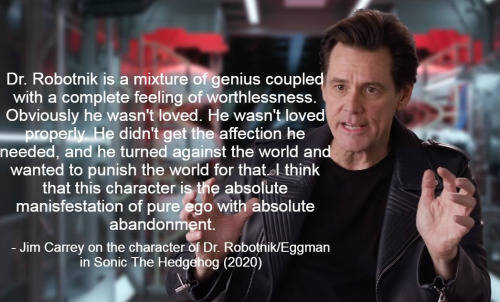
“… and all it really comes down to is, he wants to be special to somebody, only it’s gone megalomania for him.” [x]
Ouch! Poor guy, actually.
He seems a lot like Ozai in that regard. No wonder I dig this dude (aside from him being hot, that is, haha) - he’s totally the type of villain I fancy.
And also, like it’s the case with Ozai, I can’t help but wonder about his past, given there is known so little about it (aside from a few hints), so the following will be about some of my personal theories and headcanons about him, his family, and his past.
These are such important characters (main antagonists, no less), yet the creators can’t bring themselves to be more specific about the most basic facts concerning their families. Ugh, huge pet peeve here! Nobody expects a huge ancestral chart down to the tiniest details, but they could at least offer more info about their closest relatives - especially the parents, who happen to have the most formative influence on a person.
How old was he, when his parents died, anyway!? That they died seems pretty much a given, as that is what being an orphan is about, per definitionem (and he referred to himself as such). But how did they die? Did he witness their death, or was he absent?
Personally, I have this theory that their demise might very well be linked with what happened to his grandfather Gerald Robotnik, and his cousin Maria. Perhaps they were on that space research colony during the military assault, and were also amongst the “collateral damage” there.
From what I read, the recruited scientists lived there, so I reckon that they did bring their families with them, which is likely, since it is said that Maria was born there, so at least her parents must have lived there for an extended amount of time, as well. Since Ivo isn’t Maria’s brother, but her cousin, Gerald must have had at least two children, who lived alongside him (… and his wife!? No info about her, either.) on that station.
While I think both of Ivo’s parents were from prominent scientist families (after all, that is what the population of this space station was comprised of), it is still unclear whether or not they remained on that station. I am inclined to believe they might have split their time between there and Earth, as Maria and Ivo don’t appear to have been particularly close, such as, for instance, her and Shadow (who was pretty much her only friend there), but I think that might also have been the case due to a difference in age.
Maria was 12 years old when she died during the military attack on the station. Since Ivo apparently seems to have no significant memory of his parents, and seems to have spent his childhood as an orphan, he can’t have been older than 3-4 during this incident.
With Gerald arrested, and pretty much the rest of the inconvenient Robotnik family gone, aside from that small child, I think the military decided to take him along, simply because of the vast potential of this child, coming from a bloodline of geniuses, that was now theirs to mold and to exploit.
They likely left the boy in an orphanage afterwards, mostly to his own devices, and without any support, or caregiver whose bonds transcended the mere duty of keeping their fosterling alive - a lonely life, largely deprived of emotional warmth and attachment.
However, they did keep him under close monitoring, so they could intervene anytime they saw fit, to stir him in the direction they wanted - like a psychological experiment of sorts. I remember that in the movie the presiding pentagon guy referred to him as “a lab rat with teeth” - which is rather telling regarding how they perceived him, and pretty nasty, considering the implication.
The Robotnik name, though, they obviously did not refuse him - a decision they would come to regret later. While this allowed him the only tie to his ancestry, their legacy, however, didn’t do him much good.
Gerald Robotnik was a disgraced man, known to the world as the genius madman, imprisoned and sentenced to death as a criminal - which was, by far not the whole truth. And yet, he was turned into this idealised picture of a hero by his grandson, who so admired his achievents and strove to become a scientist because of it, despite knowing only the official version of the story.
The tainted reputation of his grandfather would haunt Ivo for a long time to come. It would also become the lens through which he was perceived and judged by the world at large, and this turned out to be the main reason he was rejected, and, furthermore, relentlessly bullied by his peers - irrespective of his own accomplishments, which earned him at least the praise of his authority figures.
That he eventually snapped and retaliated, did not exactly improve the situation for him. While the bullying did stop for the greater part, the peoples’ suspicion had turned into fear, as their concerns had come to pass after all, and, as a result, he was shunned even more.
In the following years, he was further on groomed to become this perfect military asset - a morally unchecked scientist and ruthless agent, that the government could deploy like the weapon they undoubtedly saw him as.
Unfortunately for them, however, their experiment didn’t quite have the outcome they had anticipated, as he not only exceeded their expectations on an intellectual and scientific level, but, at the same time, became increasingly unstable, unpredictable (”psychological tire-fire”) and, hence, potentially dangerous - to such a degree that they became very hesitant to deploy him at all (despite the “perfect operations record”), and even downright terrified of him.
Frankly, I think they’d also have ample reason to be afraid of him, other than just his obviously ambitious nature. The most prominent being a possible event, where he finds out about what truly happened to his family and himself, as well as their role in this. Needless to say, that he wouldn’t take this lightly, considering all the shit he had to endure because of it, and likely seek revenge. I’d really be curious about such a scenario.
#Dr Ivo Robotnik#Sonic the Hedgehog#movieverse#headcanon#personal opinion#not interested in a debate here#that is what rl subjects are for#fictional world is purely for wish fulfillment and processing stuff#I am merely looking for like-minded ppl here and those with a similar taste
5 notes
·
View notes
Note
Hi!! 💕I was reading across your medieval queer history tag, and I came to the part of Muslims and homosexuality where you mention the active / passive narrative that this activity had.
I had two questions and I don't know if you can help me with them. I was wondering if there was something similar to that position in Nicky's time (?) at the European part of the world. And based on that, would it be a problem for the sexual activities that Nicky and Joe might have had? (sorry for this insane curiosity) I don't know if I'm being clear, haha. I mean, would it be a problem being active/passive for Nicky and Joe? ( based on common Islamic and/or European thought of the 11th century)
Thank you!!
Hmm. I feel like this is a better subject for fanfic (i.e. how Nicky and Joe viewed their relationship in the early days) because it touches on something historians can’t answer: how historical individuals privately viewed their own internal/emotional decisions and preferences. Obviously, Nicky and Joe themselves are fictional, so the only inner feelings they themselves had about how their relationship first developed, whether in its sexual components or otherwise, are the ones that are created for them by a team of modern writers and showrunners. As a historian, I can offer some perspective on the institutional, legal, and societal mores and customs that influenced how queer behavior was collectively viewed, tolerated, or restricted, but I can’t say how any given individual would have then interpreted that to themselves. Obviously, some gay people have been raised in such deeply self-hating environments that their internalized homophobia is very embedded and they struggle for years to get over it. Some others have been raised in the same environment but have never actually accepted any of it and have less difficulty in leaving it behind. Once again, this goes into the realm of speculation rather than strictly provable history, and which goes double for fictional characters.
Queer people have always existed in a complicated and sometimes contradictory relationship with the mainstream (that is, often heteronormative) dominant society. Sometimes they accept all of it in an attempt to “pass” or because they have been taught to be homophobic, sometimes they choose to selectively adopt parts of it but try to live a secret “second life,” sometimes they reject all of it. These choices are conditioned by personal safety/family background, political, cultural, religious, and social environments, formal and informal education, kinship and friendship networks, positive/negative reinforcement, individual character, and so on. There is not necessarily a “wrong” choice for a queer person to make, because each course of action comes with its own risks and rewards, but if you’re choosing to embrace your queer identity and to live out its truth (as Joe and Nicky seem to have done relatively soon after they met), then that will involve an element of rejecting whatever constraints heteronormative society has placed on you. After all, the formal legal conventions about sodomy in the Middle Ages weren’t developed in consultation with actual queer people. They reflected the concerns of conservative establishment clergymen, who weren’t interested in promoting social acceptance of it (and yet again, this doesn’t touch on THEIR actual feelings or whatever they might have done in private). I’ve discussed the complexity of disentangling historical homoromanticism (which was pretty widely celebrated in the medieval era) and historical homosexuality (which had a rockier time, but as I wrote about in this ask, the attempted policing of sexuality and sexual behavior was as much the case for m/f relationships as m/m or f/f ones -- nobody got away from this and it wasn’t just for the gays.)
Basically, I personally don’t think that either Joe or Nicky would have had a problem with sex or certain sexual positions, just because if both of them had reached the point of deciding that a Catholic/Muslim was their true love and they were going to run off together and be a couple no matter what anyone said about it, that already entailed rejecting a huge amount of the ideology they were originally taught and grew up with. It’s again a subject for fanfic how much Joe and Nicky were personally comfortable with being queer before they met each other, so this would more likely be a rejection of religious teaching about the unworthiness/evilness of the rival faith (as Nicky says, the love of his life was from the people he had been taught to hate). Since almost all medieval queer behavior and views on queer people had a religious component, if Joe/Nicky had gotten as far as rejecting the religious tenet that told them the other was Evil, they were (again, in my opinion) extremely unlikely to use any of those old religious arguments for prohibiting or proscribing certain kinds of sexual activity. I’m sure they had to negotiate many issues in the early days of their relationship (as I write about in DVLA), but they’re clearly head over heels in love with each other, wildly attracted to each other and have been for almost a millennium, and eager to embrace the physicality of that relationship, so I don’t personally see this as being a major stumbling block.
That said, you did ask about European views on sodomy in the 11th century and whether there was a parallel to Islamic views on the moral acceptability of the active vis-a-vis the passive partner. Since antiquity, there has always been less “shame” attached to the penetrative/top partner in sex, no matter whether the receiving partner is male or female. Ancient Greece is another example of this, where the adult man could not be penetrated without insult to his manhood and dignity, but the fact of him penetrating a younger man/teenage boy was a fine and even accepted rite of passage. We can obviously talk about how this is related to phallocentrism and misogyny, because the person “receiving” sex is usually expected to be a woman or a woman-equivalent person, which entails lower social status. The dominant male can take whichever sexual partner he pleases, and it’s a mark of honor and status for him to be virile (the very, very ancient chestnut about why playboys are tolerated and admired while sexually active women are “sluts.”) The gender of his partners might not matter as much as their social class, their status in relation to his, his “right” to expect sexual availability from them, and a whole lot of other factors. This could be and also was the case in medieval Europe. But may we point out that the men engaging in these kind of explicitly unequal relationships, which are more about reinforcing power and control than real desire, are very, very unlike the equal and loving mutual partnership between Joe and Nicky, where they were clearly happy to please and respect the other in whatever way.
It has not always been the case that same-sex activity would automatically be defined and suspect, though yes, there has never been an instance in Western history where it was placed uncomplicatedly on the same level as opposite-sex activity. It had to be constructed that way. As I keep saying, modern homophobia is a lot more stringent and explicit than any medieval expressions thereof, because if “homosexuality” was not constructed as a clearly recognized identity, there was less ability to rail against it. In fact, the usual rhetorical tactic was to just ignore it. Sodomy is known as the “silent sin” or “peccatum mutum” in Latin, because moralists usually didn’t talk about it or discuss it or give it an actual framework for debate and thus implied legitimacy. There were obvious exceptions (Peter Damian, Peter the Chanter, Bernardino of Siena, Heinrich Kramer, etc, etc) and as the medieval era went on, homosexuality became more grouped in with other undesirables. But that also reflected a growing visibility/awareness among people as to what it was. As I keep saying, you can’t be anxious about something, you can’t be worried about people being susceptible to it, you can’t be worried that it’s happening in reality, if it’s just an abstract concern of rhetoric that only a handful of churchmen know about. The increasing visibility of queerness as a category of exclusion in late medieval polemics reflected a) the social stress of the crises of the late medieval world and the usual function of Others as a scapegoat and b) the fact that by then, people must have had enough awareness of it as a pattern of consistent behavior for clerics to get mileage out of attacking it.
Anyway. In an attempt to summarize: historians can’t possibly know how historical queer people felt about themselves, if they were influenced by societal or internalized homophobia (itself quite different from modern homophobia), how much of the dominant social narrative they accepted, the reasons for the choices that they made, if they saw their queer preferences as a sin or as a valid lifestyle, and so on. But it seems unlikely that historical queer people specifically in loving long-term relationships, such as Joe and Nicky, would be unduly tied to much of that, and that has always been the case.
37 notes
·
View notes
Text
Well, I caught up on Wings of Fire and then a three and half page headcanon/partial rewriting of HiveWing society appeared on my computer. Might as well post it, so here we go.
HiveWings and SilkWings are both smaller and fuzzier than Pyrrhian dragons. HiveWings are not NightWing hybrids. Pantalan language is the fantasy equivalent of the Latin-Greek mashup used in real life scientific names, so that I can name dragons Anax and Vespa and whatnot.
Food production is a big deal in Pantala after the initial war against the othermind. Both tribes rely on plants; SilkWings are exclusively herbivorous, while plant sap and nectar makes up a large part of the HiveWing diet. Pantalans have made great advances in greenhouse agriculture, but greenhouses require constant maintenance. The structure of the hives is always being rearranged to make the most of the limited lumber supplies that can be grown. The dragons of the empire must work constantly in order to maintain their way of life, and dragonets are expected to work just as much as adults. SilkWing dragonets work on web maintenance teams, and both HiveWing and SilkWing dragonets work in food processing.
HiveWings
A collection of related tribes that unified against the threat of the othermind. The eusocial groups have queens of their own, but these are figureheads and the real governing power is held by Wasp’s parasitoid dynasty. All HiveWings have antennae, which are usually shorter than those of SilkWings, and go through metamorphosis. They tend to be yellow and black, but can be any color. Only females produce venom, but males still have tail barbs that can be used as weapons. Dragonets produce silk until they undergo metamorphosis, but most jobs that require silk production are left to SilkWings. (Bees, wasps, and ants make silk in real life—it’s actually stronger than caterpillar silk!)
· Parasitoid ruling caste
Based on various parasitoid wasps, these HiveWings range from small to medium in size. They have a slender, almost frail, build and extremely long tails with small stingers at the end. When an egg or dragonet is stung by one of these HiveWings, the dragonet becomes unusually compliant, following any order they are given. When the dragonet goes through metamorphosis, they emerge as a parasitoid HiveWing adult, no matter what they were originally. The implanted compliance wears off, and the new adult’s mind is a blend of their original self and their parasitoid parent. SilkWings are not allowed to care for their own eggs, and the HiveWing nest caretakers are ordered to allow a small number of eggs to be implanted by high-ranking parasitoid HiveWings.
Typical parasitoid HiveWings are non-confrontational by nature and are unfailingly polite. They coordinate the activities of the different hives, acting as mediators and pacifiers when old tensions flare up. Today parasitoid HiveWings hold all of the empire’s governing positions and have other people to be aggressive for them. Some have paralyzing venom, and these are often assigned to police work.
In ancient times, parasitoid HiveWings worked with SilkWings to unite the hives against the othermind. They are known for their reluctance to fight, and the notoriously warlike hives were more willing to listen to them than anyone from an enemy hive. The parasitoids facilitated communication and cooperation between the hives. Once the hives joined together, their role evolved into governing the new empire. The SilkWings, who were once their partners, became mere tools. Queen Wasp is the latest ruling member of the parasitoid dynasty. She’s limited to standard parasitoid brainwashing in this version.
· Eusocial wasps and bees
Based on social wasps and bees like yellowjackets and honeybees, these are the generic HiveWing: large, boldly colored, and aggressively protective of their society. They live in large family colonies, each of which has its own queen—subordinate to Queen Wasp, of course. These HiveWings have the ability to project their emotions to any of their relatives in a limited radius, so that if one is angry, all her sisters nearby are as well. They often have abilities useful in construction and craftswork, such as secreting wax or gluey saliva. They are typically assigned work as soldiers, artisans, hunters, or SilkWing overseers in construction and agriculture.
· Ants
Based on ants, these small to medium sized HiveWings have a colony structure similar to the previous HiveWing caste. They can project their emotions over a larger area to any ant HiveWings, not just their relatives. They have four wings like all HiveWings, but their wing membranes do not heal like other dragons’ do, developing tears that cannot be repaired. Their wings become useless after only a few flights and the wing limbs eventually atrophy from lack of use.
Most ant HiveWings work as SilkWing handlers and nest attendants. In ancient times, this was a more mutualistic and equal partnership negotiated between specific groups of HiveWings and SilkWings. Today, it’s slavery pretending to be a beneficial extension of that ancient relationship. Ant HiveWings are more familiar with SilkWings than most other HiveWings; this can push them toward rebellion on behalf of their SilkWing neighbors or toward abuse of their power. It’s not a coincidence that most Pantalan hybrids are produced from SilkWing and ant HiveWing parents.
· Solitary wasps and bees (including parasitoids that prey on adults)
Based on solitary wasps and bees, these HiveWings are similar in size to the eusocial wasp/bee HiveWings. They are the lowest ranking HiveWing caste, considered little better than SilkWings. They are notoriously meek compared to the eusocial HiveWings. Some possess paralyzing venom; these are based on parasitoid wasps that prey on adult insects. Although they are commonly considered the most useless HiveWings in combat, the most devastating venom of any HiveWing can be found in this caste. The parasitoid rulers are biologically part of this group, but due to their influence and brainwashing abilities they were able to come out on top while their relatives were pushed to the bottom. The solitary HiveWings are believed to have little culture of their own.
SilkWings
Literally connect the hives and hold the empire together. SilkWings are often used as status symbols, and work in construction and food production. Particularly dangerous work is usually left to the eusocial and solitary HiveWings, since SilkWings are so valuable and need HiveWing protection.
SilkWings produce silk all their lives, but dragonets make a lot more. The massive silken roads between the hives are only possible because of the use of dragonet labor.
Although believed to have no natural defenses, SilkWings are frequently born with venomous spines and chemical defenses such as spraying toxins. (This would replace flamesilk in my version of Pantala.) These defenses are usually removed after hatching by HiveWing nest attendants. SilkWings also have incredibly long, prehensile, pointed tongues that could poke someone’s eye out if you’re not careful.
Some SilkWings bear an uncanny resemblance to HiveWings or LeafWings. HiveWing mimics can pass as true HiveWings in society, but face severe punishment if they’re caught. LeafWing mimics are understood to be SilkWings but are distrusted and frequently the victims of violence due to their resemblance to the hives’ ancient enemies. They’re still around because they benefit the propaganda machine; they are a constant reminder of the threat LeafWings pose and also a harmless explanation for any actual sightings of LeafWing infiltrators.
Hybrids
Parents from two different HiveWing tribes produce hybrids, although they are not officially recognized as such due to both parents being HiveWings. HiveWing/SilkWing hybrids are commonplace (unfortunately, given the omnipresent power differentials) and accepted. Officially, they share the caste of whichever parent legally claims them; in practice, they form a caste of their own between HiveWings and SilkWings. HiveWing parents who want the child always successfully claim them and the SilkWing parent cannot treat them as their child. Hybrids with venom are usually claimed as HiveWings, although not necessarily by their true HiveWing parent. Many hybrids do not go through metamorphosis, and their wings instead grow steadily throughout childhood.
LeafWing hybrids are extremely rare today and persecuted by LeafWings and HiveWings both. They are most often found in SilkWing communities passing as LeafWing mimics. They were much more common in the past; HiveWings were infamous for mistaking boldly colored LeafWings for true HiveWings.
Some types of hybrids:
· Flies are produced from an ant HiveWing and any other parent tribe, and are small to medium sized. Their hindwings degrade like an ant HiveWings’ but their forewings remain. They are famously good fliers and usually raised as HiveWings due to this despite their lack of venom.
· Beetles are produced from ant HiveWing and any other parent tribe. They are extremely variable in size; the largest Pantalan dragons are beetle hybrids. Their forewings degrade, becoming hard and immobile except at the shoulder joint. They never have venom but may have other chemical defenses, such as spraying burning hot liquid.
· Webspinners are produced from SilkWing and ant HiveWing parents and are usually dully colored. Both their sets of wings degrade. They are almost always raised as SilkWings, as they never have venom and produce even more silk than a true SilkWing.
· Spiders and scorpions are produced from SilkWings and ant HiveWings. Their wing membranes degrade but their wing limbs do not atrophy and can be used as extra legs. They are usually raised as HiveWings because they always have venom, although spiders produce silk their entire lives and may be raised as SilkWings.
· Dragonflies and damselflies are produced from SilkWings and non-ant HiveWings. They never have venom and are usually brightly colored. Dragonflies are incredible fliers and usually raised as HiveWings, while damselflies are usually raised as SilkWings.
6 notes
·
View notes
Text
Last Divines of Solandril
Regneva Green Titan Log Entry 2
There are a total of 8 Divines that have been seen and active in the world of Solandril. I have encountered them and will be recording this log to give anyone who sees it an understanding of the Divines of Solandri. They are represented in three male, three female and two primal/bestial vessels. These divine vessels each have different aspects based off of their origin. While some of the Divine came into Solandril as Divine beings from their respective worlds or universes, there are some who were chosen by the aspect they represent to become a Divine when they entered Solandril through the singularities. The aspects of the Divine are as follows: warm earth/living flora, beasts/fauna, cold earth/living stone, sun/light, civilization/order, war/peace, abyssal/daemonic and the ethereal.
It is important to understand that the Divine have unique characteristics. Most Divines wield unique weapons, shields, and armor that are unique. Each Divine has a unique aura and other abilities that serve different purposes in various scenarios. The Divines are immune to damage from any source with the exception being a source of Divine damage. Typically only a Divine can slay another by killing the Divine and absorbing their aspect, however there are unique exceptions to this rule.
The Divine of war and peace is known as Sandra. Bearing the semblance of an ancient shield maiden, Sandra is an armored warrior that is a compassionate to intelligent life and is an expert in close combat and tactics. She defends those she recognizes as her declared “subjects”, and has an adverse relationship with Divines Terranius, Mutonbar, and Ri Tan. She see both primordial Divines as threats to the faction she leads and despises Mutonbar for his mixed Divine and daemonic nature. She seeks to bring about peace between the factions on this world but doesn’t agree with Korinthus on the definition of unity under one civilization. She has allied herself with fellow Divine Elaine due to an unknown promise between the two when they met on Solandril. Sandra has a neutral stance towards Divines Korinthus, Solatlan and Serena. Bearing the Bronze shield of a long gone civilization that can brace against any attack along with the divine spear known as “Peacemaker”. This unique spear is capable of inflicting wounds that sap the strength of the opponent, allowing Sandra to gain an advantage in attritional combat should she land her strikes.
The Divine of living earth and flora is known as Elaine. She appears as a maiden from the forest and does not like to fight in conflicts, but will if she must. She much like her fellow Divine Serena and is compassionate for all life. She encourages cooperation between the various factions but she is allied to Divine Sandra and remains at her side. She has an adverse relationship with Terranius and Mutonbar while maintaining a neutral stance with Korinthus, Serena, and Solatlan. She is wishes to improve relations with Divine Ri Tan as a fellow caregiver of life, but her efforts have been rejected each time she encounters the Divine of beasts and fauna. She bears the “Great Oak Shield” that preserves the life force of the wielder and their immediate allies, enabling one to survive fatal wounds so long as the shield bearer does not surrender the shield voluntarily. Her divine bow although unnamed was made from the same oak tree as her shield, any shot she fires from it or that of an individual gifted this bow will always reach its mark with the property of divine damage inflicted.
The Divine of beasts and fauna is known as Ri Tan. He bears the form of a primal being riding a divine Sky Scorpion and wields a spear made from the bones of a divine beast. Ri Tan is rather alien compared to the other Divines with one exception. He has an adverse relation with Divine Sandra as she sees him as nothing more than an animal. He has a developing relationship with Korinthus and Solatlan as they treat him with respect. Ri Tan has a neutral stance towards Elaine, Serena and Mutonbar. The only Divine he considers himself an ally to is Terranius since their primordial connection allows each to understand the other without error. He seeks the protection of the wilds and has a adverse relationship with intelligent life forms that find themselves on this world and leads his own faction for conquest known as the Primordials. He is able to call upon the wilds to bring up an army of natural creatures. The spear he wields is known as “Beastslayer”, a weapon capable of inflicting wounds that force an opponent to lose control and give into primal instincts and lose higher cognitive thinking.
The Divine of unliving earth and stone is known as Terranius. Bearing the form of a small rock golem, he is without a distinguishable weapon other than his own being. He is much like Ri Tan in he can only communicate with certain beings, these being other Divines mostly. He is the most alien of the Divines, being an uncaring and indifferent being to the newcomers to his world. He is the most docile and inactive of the Divines seeking only to journey and observe. Every Divine except for two fear him as his stone body has the ability to draw out the store the divinity to make him stronger and his opponent weaker. If a divine is subject to this aura for an extended time then he can remove their divinity permanently and result in Terranius inheriting the aspect the other Divine lost. Terranius is the only Divine who is truly immortal, he is tough and even if destroyed by a divine weapon then Solandril will remake him anew. The only Divines capable of withstanding his aura is the Divine of Sun and Light known as Solatlan and the Divine of Beasts Ri Tan. Both individuals are considered friends by Terranius as they actively communicate and socialize with Terranius whenever they can. Terranius has a neutral standing with every other Divine despite their fear towards him.
The Divine of the Sun and Light is known as Solatlan. A man in the form of a warrior from a fallen empire. He is an indifferent Divine in appearance with a calculating mind, actively seeking to unify the world he finds himself in. He currently is allied to Korinthus and Mutonbar. His alliance with Korinthus is out of shared desire to unite the peoples of Solandril while his “alliance” with Mutonbar is derived from an unknown agreement between the two. His relations to Divines Ri Tan and Terranius is improving but hasn’t been cemented as an alliance yet. He has a neutral standing with Divines Elaine, Serena and Sandra. Bearing the Divine spear and shield known as “Sunscorcher” and “Eternity Ward”. The spear is capable of slaying other Divines by burning their divinity with each wound, fueling the fire within the wielder. This weapon can also call down beams of scorching light from the Sun along with turning mortals to ash should they be wounded by this spear. His unique aura allows him to restrain demons of darkness and withstand the aura of Terranius. His shield creates a ward that shields him from taking any ranged damage thus only close quarters combat is the way to harm this Divine.
The Divine of Civilization and Order is called Korinthus. A man in the form of a commanding officer from legions that brought, kingdoms, cities and empires of his former world to their knees. An inspiring divine that shares the vision of Divine Solatlan to unify the world they find themselves upon. He is a logistical and tactical genius that seeks to build a lasting civilization to promote order in the ensuring chaos of the singularity events. In their alliance Korinthus takes the role as the visible leader while Solatlan remains at his side, his loyal companion with a shared dream. The Divine of Order sees the necessity to better relations with Ri Tan and Terranius, however he still has a neutral standing with them due to their primordial nature. He has a adverse relationship with Sandra and Elaine, with the first due to her refusal to accept his unity and the second because of civilization’s nature to reap the natural world. He has a tedious alliance with Mutonbar due to the Divines connection and loyalty to Solatlan, however Korinthus still does not trust him due to Mutonbar’s past involving another Divine. Serena is another divine that is secretly in an alliance with Korinthus for reasons unknown. Korinthus bears divine armor known as the “Imperial Armor”, this armor is capable of resisting the additional effects of most divine weapons. His divine sword although unnamed is still a potent weapon in his hands even without a unique lasting property unlike the other Divines. His aura is what makes him unique among the other Divines, he inspires mortals to exceed their own expectations and make them unbreakable in combat. His true power lies in his ability to share his aura with a few mortals making them Demi-Divines capable of harming and slaying true Divines.
The last Divine is named Serena of the Ethereal Snow. Serena takes the form of a species strongly linked with the ethereal plane. She is wise, stern and compassionate in a different sense similar to Elaine but different from Sandra as she is empathetic to all beings, regardless of origin. She has a neutral standing with most divines except for Korinthus and Terranius. Her relation to Korinthus is the two are secret allies for personal reasons. She like most divines has an innate fear of Terranius, but her fear of Terranius is personal as the Divine of stone actually absorbs the very ethereal essence of any being he goes near not just the Divines. Her aura that allows her to commune with ethereal spirits which enables her to seek information form unconventional sources. She has the unique linguistic ability to speak to any faction on Solandril in peaceful terms as her presence is extremely disarming. As a result of her ethereal power, unlike the other Divines she has an understanding of what events occurred to create the world of Solandril. However she refuses to inform her fellow Divines of the truth for reasons unknown. She possesses two divine items, one divine sword and one shield. The divine shield is known as the “Ethereal Ward”, allowing the wielder to phase in and out of the ethereal plane, augmenting her combat potential and travel the land a faster pace compared to that of Mutonbar. Her divine sword is known as “Spiritbane”, a unique divine weapon that does no direct harm to the physical ream of the target, but saps the ethereal energy from the individual who is wounded. This divine sword by its nature can’t kill any being, Divine or not. All it can do is render the target unconscious until they retain enough life energy to regain consciousness.
According to the Divine, the strongest among them is Solatlan. His warrior spirit and unique weaponry give him an advantage in most divine combat. The next is Divine Terranius of unliving/cold earth. Even though he possesses no unique wieldable weapon, he himself is a Divine slayer and the only true immortal in Solandril. Divine Sandra is next and she is another warrior with skill to match Solatlan and possibly even exceed him, however her weaponry is not the best suited to counter the Divine of the Sun and Light. The next two strongest Divines are Ri Tan and Mutonbar. Mutonbar is a barbarian in combat with more default strength than most other Divines, however his lack of advanced skill in combat is his downfall. While Ri Tan is not a powerhouse in strength or possessing a strong divine weapon, his raw skill outclasses that of Sandra and Solatlan. The next two strongest Divines are Elaine and Serena. Elaine is not a direct combat specialist but can be a grave threat for any Divine from range. Serena avoids combat as much as possible but if she chooses to fight she can possibly defeat most Divines except for the top two. However it is important to note that even though Serena lacks the capability to slay any Divines, she is a master duelist and can render them unconscious for long durations of time. The weakest is the Divine of Civilization Korinthus. He can hold his own in combat with most other Divines, but he will still lose in an attritional battle with all of them. His strength lies in his ability to support others rather than himself, as is the nature of civilization.
Regneva Green Titan Log Entry 2
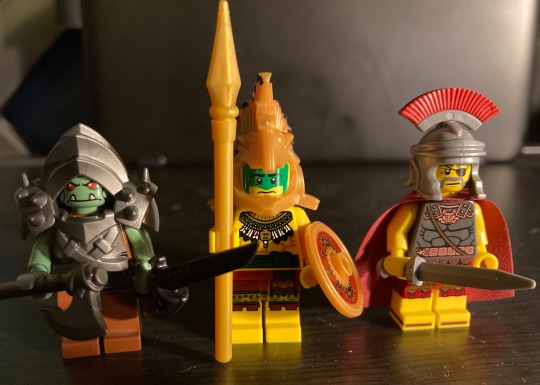
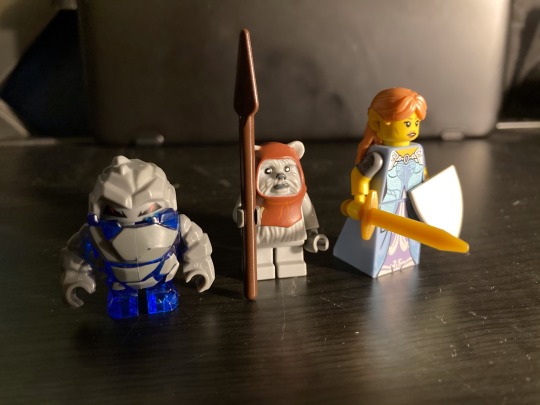

6 notes
·
View notes